 Sign in
Sign in
Business
Jonathan Goldhill
The Disruptive Successor Show is a podcast for next-generation leaders in family businesses and entrepreneurs who want to disrupt the status quo to grow their business and take it to the next level.
We all know that what got us here isn’t going to get us there.
If you are taking control over your family’s business or trying to get your business to the next level, you will need inspiration, advice and resources to help you create a massive impact.
Listeners of my show include not only the millennial or Gen Z but also the Baby Boomer and Gen Y. My listeners tend to be involved in these industries: business services, construction, design-build-maintain landscape contracting, food manufacturing, property management, real estate, and technology.
And are interested in issues like business coaching, branding, communication, difficult conversations, disruption, employee ownership, exit planning, financial management, leadership, innovation, intergenerational transfer, marketing, multi-generational family businesses, business operations, process documentation, security, selling, storytelling, succession, visioning, wealth management,
My guests are entrepreneurs, family business advisors, multi-generational and Gen 2 family business leaders, heads of university family business programs, consultants, coaches and firms that serve those who are growth businesses.
Clients of my show typically are running businesses with 10 to 200 employees and $1M to $20M in revenues.
Their concerns include: scaling up, exit planning, succession, leadership development, disruption, business planning, finances, growth planning, transferring generational wealth, transferring control, ownership issues, and more.
The benefits listeners receive are introductions to experts and advisors around the issues of growing and exiting a business, whether it’s a family business or entrepreneurial venture. They get a feel for the challenges other business owners and leaders face and how they overcame them. They will hear stories from people and how they came to do their work and why.
My shows feature handpicked guests who engage with me in casual conversations lasting between 30 to 40 minutes. You can expect to be entertained, engaged and may even get takeaways like business tools or ideas for implementation in your business.
I’ve led entrepreneurial adventures in art, clothing, a holistic health lifestyle magazine and trade show, shoe manufacturing. I’ve also led several non-profit organizations. I earned an MBA from the University of Southern California in Entrepreneurship.
I’ve been advising, coaching and consulting family-owned, family-run and entrepreneur-led businesses since 1989. My love for entrepreneurship follows the closure of my family’s sizeable multi-generational clothing manufacturing company after eight decades of operation because there were no successors.
After uncovering the code to scale up a family-run business - a playbook and a disruptive successor - I wrote a book called Disruptive Successor: A Guide To Driving Growth in Your Family Business.
My podcast is my effort to bring interested people into the conversation to benefit disruptive successors.

Episode 135 - Leadership, Culture, and Winning the War on Talent in M&A with Claire Chandler
ABOUT CLAIREClaire Chandler is the President and Founder of Talent Boost. With nearly 30 years of experience in people leadership, human resources, and business ownership, Claire specializes in aligning HR and business leaders to deliver strategic outcomes. She helps leadership teams work together more effectively to accelerate business growth.SHOW SUMMARYIn this episode of the Disruptive Successor Show, Jonathan Goldhill interviews Claire Chandler, President and Founder of Talent Boost, about leadership, culture, and how to successfully navigate mergers and acquisitions. Claire emphasizes the importance of strategic alignment and cultural integration in M&A activities, as well as the role of leaders in shaping culture. She also discusses the challenges faced by family businesses during transitions and offers insights on how to maintain continuity while putting one's own stamp on the business. Claire shares a story of a successful merger and highlights the significance of trust and vision in driving organizational success.KEY TAKEAWAYSStrategic alignment and cultural integration are crucial for successful mergers and acquisitions.Leaders shape culture, and stronger cultures drive greater success.Focusing on the vision and helping employees make a tangible connection to it is essential for alignment and engagement.Conviction, not convincing, is key for leaders to inspire and rally their teams.Family businesses must focus on continuity while allowing successors to put their own stamp on the business.QUOTES"Leaders shape culture, and stronger cultures drive greater success.""Focusing on the vision first is deeply important.""Conviction, not convincing, is key for leaders to inspire and rally their teams.""Family businesses must focus on continuity while allowing successors to put their own stamp on the business."Connect with Claire through the link below.LinkedIn: https://www.linkedin.com/in/clairechandlersphr/Claire’s Book: https://www.clairechandler.net/culture/If you enjoyed today’s episode, please subscribe, review, and share with a friend who would benefit from the message. If you’re interested in picking up a copy of Jonathan Goldhill’s book, Disruptive Successor, go to the website at www.DisruptiveSuccessor.com
36:4908/08/2023

Episode 134 - Overcoming Adversity and Maximizing Business Success with Robin Osborn
ABOUT ROBINRobin Osborne is an executive coach and business consultant who has over 33 years of experience in running her family business. She took over the business at the age of 21 and successfully doubled its revenue in just 18 months. Robin is also a survivor of a life-threatening brain tumor and has used her own recovery journey to inspire transformation in her clients.SHOW SUMMARYIn this episode of the Disruptive Successor Show, Jonathan Goldhill interviews Robin Osborne, an executive coach and business consultant who shares her experience of taking over her family business at a young age and successfully growing it. Robin also discusses her miraculous recovery from a brain tumor and how she has used her own journey to help others achieve their personal and professional goals. She emphasizes the importance of values, communication, and proactive management in family businesses, and provides insights on how to overcome head trash and achieve freedom and fulfillment in both business and personal life.KEY TAKEAWAYSTaking over a family business at a young age requires earning the trust and respect of employees through care, right decisions, and course correction.Adversity can be a gift that leads to personal and professional growth.Implementing a customized operating system and focusing on values can transform a family business and create a healthy culture.Head trash, such as limiting beliefs and negative self-talk, can be overcome through tools like DISC and NLP.KPIs should be tailored to the unique needs of each business and focus on leading indicators that drive outcomes.Personal health and well-being are essential for effective leadership and should be prioritized through measurable goals and self-care practices.QUOTES"We can't change what we tolerate, so we've got to look at the mirror and start with ourselves." - Robin Osborne"Delegation is not something that comes natural for a lot of leaders. So, what's it costing you to do five hours of paperwork a week?" - Robin OsborneConnect with Robin through the link below.LinkedIn: https://www.linkedin.com/in/robinosborn/If you enjoyed today’s episode, please subscribe, review, and share with a friend who would benefit from the message. If you’re interested in picking up a copy of Jonathan Goldhill’s book, Disruptive Successor, go to the website at www.DisruptiveSuccessor.com
48:3001/08/2023

Episode 133 - Building Businesses for Freedom and Fulfillment with Joe Rare
Joe Rare is an Owner and CEO of Level 9 Virtual, a serial entrepreneur, investor, outsourcing expert, and owner of multiple digital companies, wedding venues, and real estate investment properties. He is known for his expertise in scaling businesses and managing growth, competition, and innovation. Joe is passionate about creating freedom in his time and building businesses that can operate without his constant presence.In this episode of The Disruptive Successor Show, Joe Rare shares his mindset and strategies for building successful businesses and achieving work-life balance. He emphasizes the importance of starting with the end in mind and building businesses that can operate without the owner's constant presence. Joe discusses the lessons he learned from Robert Kiyosaki's book "Rich Dad, Poor Dad" and how it shaped his approach to entrepreneurship. He also highlights the value of business process standardization and the role it plays in scaling a business. Joe shares his personal experiences as a father and husband, and how he balances his entrepreneurial ventures with family time.HIGHLIGHT QUOTES"The business owner needs to be the smartest working, right? If he's the smartest working, he's going to put more effective people into operation that can accomplish more than he can by himself." - Joe Rare"Building out processes for a business is time-consuming, but it saves a ton of money in the long run." - Joe Rare"Double down on marketing and training during a recession to gain market share." - Joe RareConnect with Joe through the link below.LinkedIn: https://www.linkedin.com/in/joerare/If you enjoyed today’s episode, please subscribe, review, and share with a friend who would benefit from the message. If you’re interested in picking up a copy of Jonathan Goldhill’s book, Disruptive Successor, go to the website at www.DisruptiveSuccessor.com
47:5625/07/2023

Episode 132 - Fractional Executives are not Consultants or Advisors with Ben Wolf
ABOUT THE GUESTBen Wolf is the founder of Wolf's Edge Integrators and the author of the best-selling book "Fractional Leadership: Landing Executive Talent You Thought Was Out of Reach." He has extensive experience in the entrepreneurial space, having built and grown multiple businesses. Ben now leads a team of fractional COOs who help businesses transition from chaos to control.SHOW SUMMARYIn this episode of The Disruptive Successor Show, Ben Wolf, founder of Wolf's Edge Integrators, discusses the role of fractional executives in helping businesses transition from chaos to control. He explains that fractional executives are not consultants or advisors, but rather leaders who sit on the organizational chart and are responsible for specific functions within the business. Ben emphasizes the importance of understanding whether a business needs a leader or a doer and highlights the value of fractional executives in providing high-level expertise at a fraction of the cost. He also introduces the concept of a "chaos to control" roadmap, which helps businesses prioritize and execute their goals.HIGHLIGHT QUOTES“We get people into good management habits so that they, you know, and obviously when there's a real emergency or something's truly temp sensitive, we'll address it right then. But a lot of times, it's not a lot of times. It's just that's what you just thought of a question. So you just ask it. But instead of addressing it, then we add it to our issues list for the weekly meeting or for the leadership team meeting, right?” - Ben Wolf“You need to be very mindful about what do you truly need. Maybe that experienced executive who's run businesses before, or that CMO that runs a marketing team of 10 or 20 people already is like shooting a rabbit with an elephant gun. Like you just don't need you. Maybe you don't need that right now.” - Ben Wolf Connect with Ben and learn more about his work:LinkedIn: https://www.linkedin.com/in/benjaminwolf/Website: https://www.fractionalleadership.io/If you enjoyed today’s episode, please subscribe, review, and share with a friend who would benefit from the message. If you’re interested in picking up a copy of Jonathan Goldhill’s book, Disruptive Successor, go to the website at www.DisruptiveSuccessor.com
39:5618/07/2023

Episode 131 - The Importance of Digital Transformation and Governance in Family Businesses with Danielle Valkner
Danielle Valkner is a partner with PwC (formerly known as PricewaterhouseCoopers), one of the largest accounting firms in the world. She serves as the private US family office leader out of Chicago, where she works with enterprising families to preserve and grow their legacy and develop strategic plans to realize their goals for the family and their enterprise. Danielle has over 25 years of experience focusing on finance effectiveness, technology, and operations.In this episode of the Disruptive Successor Show, Jonathan Goldhill interviews Danielle Valkner about the research behind family businesses and the challenges they face. They discuss the importance of digital transformation, the need for strong corporate governance, and the significance of purpose and legacy in family businesses. Danielle shares insights from PwC's biannual survey of family businesses, highlighting the low adoption of digital capabilities and the missed opportunities in governance and philanthropy. She emphasizes the importance of constant innovation and trust-building in family businesses, and the role of professionals in supporting their success.HIGHLIGHT QUOTES“Sharing with them that mission and what you're doing, sharing that “why” that we talked about and providing the data around that to your stakeholders, whether that be your customers or your employees is really important.” - Danielle Valkner“You always have to be investing in innovation and in your people.” - Danielle Valkner“Our family businesses and our private wealth owners are changing the world when it comes to investing and protecting the environment” - Danielle ValknerLearn more about Danielle and her works:LinkedIn: https://www.linkedin.com/in/danielle-valkner-b2605b1a/Website: https://www.pwc.com/If you enjoyed today’s episode, please subscribe, review, and share with a friend who would benefit from the message. If you’re interested in picking up a copy of Jonathan Goldhill’s book, Disruptive Successor, go to the website at www.DisruptiveSuccessor.com
40:5811/07/2023

Episode 130 - The Value of Having an Executive Assistant in Your Business with Ethan and Stephanie Bull
In this episode of Disruptive Successor, Jonathan Goldhill is joined by Ethan Bull and Stephanie Bull, the co-founders of ProAssisting, a next-generation remote executive assistance firm for business owners and C-suite executives. With backgrounds in various industries, including advertising, entertainment, finance, and fashion, they have held senior positions supporting CEOs and have an intimate understanding of the principal-family relationship.Ethan and Stephanie Bull discuss the value of having an executive assistant in your business and how their company, ProAssisting, provides high-level remote executive assistance. They explain that ProAssisting fills the gap between traditional virtual assistants and hiring a full-time assistant, offering a three-to-one executive-to-assistant ratio. They emphasize the importance of having an assistant who can provide business partnership, project management, scheduling, and personal assistance. Ethan and Stephanie also discuss the challenges of working together as a married couple and the need for effective communication. HIGHLIGHT QUOTES“Working together has forced us to communicate better in everything.” - Stephanie Bull“We really started tracking our monthly spending on a down to the penny basis. And those conversations between us really set the foundation for a successful business.” - Ethan Bull“Certainly the elephant in the room is AI and how that is going to play a role in all of our lives” - Stephanie Bull“We are going to go through this 5 to 10 year period where you're still going to have a lot of people who frankly don't care about AI.” - Ethan Bull Connect with Ethan and Stephanie and get their book:Ethan’s LinkedIn: https://www.linkedin.com/in/ethanbull/Stephanie’s LinkedIn: https://www.linkedin.com/in/stephaniebull/Amazon: https://www.amazon.com/29-Hour-Work-Day-Performers-Leveraging-ebook/dp/B09ZDC4R65If you enjoyed today’s episode, please subscribe, review, and share with a friend who would benefit from the message. If you’re interested in picking up a copy of Jonathan Goldhill’s book, Disruptive Successor, go to the website at www.DisruptiveSuccessor.com
40:4406/07/2023

Episode 129 - Assess Next Gen: A New Assessment for Rising Leaders in Family Businesses with Doug Gray
In this episode of Disruptive Successor, Jonathan Goldhill interviews Doug Gray, a consultant with the Family Business Consulting Group and co-founder at Assess Next Gen. Doug specializes in leadership development, succession planning, and building family unity and enterprising families.Doug talks about the assessment he developed for rising leaders in family businesses, which helps older generations and next gens to overcome sleeplessness and angst. He also discusses how assessments can be useful for family businesses and the difference between quantitative and qualitative assessments.HIGHLIGHT QUOTESThe theoretical model and whittling down to 50 items - Doug: “360 assessments are the most valid form of feedback known to humans, and they exist in traded companies and they're poorly used in most publicly traded companies.”AI will not replace recommendations; motivation for creating assessment; marketing strategy - Doug: “AI will never replace these recommendations. It can provide its own recommendations, but there's no threat there. We're clearly focusing on three of the buckets. We assess, we recommend, and we serve our clients.”Connect with Doug through the links below:LinkedIn: https://www.linkedin.com/in/doug-gray-phd/Website: https://action-learning.com/If you enjoyed today’s episode, please subscribe, review, and share with a friend who would benefit from the message. If you’re interested in picking up a copy of Jonathan Goldhill’s book, Disruptive Successor, go to the website at www.DisruptiveSuccessor.com
26:3927/06/2023

Episode 128 - Disturbing trends in family business finances with Tim Yurek
In this episode of The Disruptive Successor Show, Jonathan Goldhill interviews Tim Yurek, the founder and CEO of Tier 1 Capital. With over 35 years of experience in financial consulting, Tim specializes in growing businesses, attracting and retaining top talent, planning for business succession, and converting business equity into cash. He has been featured on major media outlets such as Bloomberg TV and is a thought leader in his industry. In this interview, Tim and Jonathan discuss the disturbing trends that threaten family business owners, ways that people are losing control of their money, and how to retire from one generation to the next without bankrupting the next generation. Tim shares his personal story of how he got into the financial consulting industry and the epiphany moment that changed his life. HIGHLIGHT QUOTES Unlocking Employee Engagement and Motivation in Small Businesses: Strategies Beyond Equity Incentives - Tim: "Yeah. So it is very important for small businesses to find ways to attract, retain, and reward their people. But here's the catch. How do you do this without giving away equity? Because at the end of the day, it's a family business or it's a small business. And most business owners got into business to be in control so they can control their own destiny. If you start giving away equity, you're giving away your security, you're giving away your control." Ensuring a Prosperous Retirement and Smooth Transition for Small Business Owners - Jonathan: "And it's important that people who want to retire their businesses are able to retire in a lifestyle that they've grown accustomed to. And sometimes I just find that they're robbing from the next generation to save themselves or they haven't really planned for that next generation. So it's really nice to know that there's someone and that this is what you are doing, is helping people with this." Connect with Tim:LinkedIn: https://www.linkedin.com/in/timothy-yurek/Website: https://tier1capital.com/ If you enjoyed today’s episode, please subscribe, review, and share with a friend who would benefit from the message. If you’re interested in picking up a copy of Jonathan Goldhill’s book, Disruptive Successor, go to the website at www.DisruptiveSuccessor.com
45:5022/06/2023

Episode 127 - What's Your Leadership Style? Fixer, Artist, Builder or Strategist w/ Robert Jordan
In this episode of The Disruptive Successor Show, Jonathan features Robert Jordan, CEO of InterimExecs and Co-Author of Right Leader Right Time. He talks about insights on leadership styles he's seen growing up in a family business.Jonathan and Robert talk about utilizing DISC assessments and understanding different profiles in leadership and other responsibilities, how one can determine their leadership style, and look into the styles of notable leaders throughout history such as Bill Gates. HIGHLIGHT QUOTESRobert: Should take as many leadership IQ assessments as possible?"The vast majority of executives who've shown up with us, their careers are okay but you wouldn't describe their leadership journeys and say "Oh my God, this is amazing". If we had to attribute that to one thing, it would be attempting to be all things to all people"Robert: How do you lean on your team for support?"On your team, are we all playing on the same side or with the same set of rules? Which is to say "Are we trying to become more authentic with each other?" Will that advance our team? Because if that's the premise we're under it's going to be better not just for me selfishly, but better for everybody else in the team to know that." Connect with Robert:LinkedIn: https://www.linkedin.com/in/robertjjordan/Website: https://interimexecs.com/ If you enjoyed today’s episode, please subscribe, review, and share with a friend who would benefit from the message. If you’re interested in picking up a copy of Jonathan Goldhill’s book, Disruptive Successor, go to the website at www.DisruptiveSuccessor.com
40:2230/05/2023

Episode 126 - Family Business Advisor Eva Fischer Hansen Shares Her Experience as Chair of One of Europe's Leading Clean-Energy Companies
In this episode of The Disruptive Successor Show, Jonathan features Eva Fischer Hansen, Family Business Advisor and Former Chairwoman of the Board of Brunata. She shares the history behind Brunata becoming one of Scandinavia's largest clean tech companies.She talks about the challenges of handling the business simply with all the natural aspects and systems already existing in the company. Of course, she also shares about how she interacts with her siblings and family outside of work as she admits even this can be a challenge as well! HIGHLIGHT QUOTESEva: Understand the importance of family outside of work"I try really to advise the family to take the company out of the Sunday dinner. Especially when you have somebody from the family or all the family working in the company. The problem is, if you bring it to the Sunday dinner, the one working in the company never has a minute to be in the family."Eva on her father initially not wanting to leave the position"I think sometimes when the one in the position is leaving the company or have to step back because of age, it's like you're getting closer to the end of life. I think that's why these family business owners have such a hard time leaving their positions. It's again like you will go to the care home and you know that's the last journey." Connect with Eva:LinkedIn | WebsiteIf you enjoyed today’s episode, please subscribe, review, and share with a friend who would benefit from the message. If you’re interested in picking up a copy of Jonathan Goldhill’s book, Disruptive Successor, go to the website at www.DisruptiveSuccessor.com
36:0523/05/2023

Episode 125 - Amanda Holmes, CEO of Chet Holmes Int'l., Disruptive Successor Story and Growth Tips
In this episode of The Disruptive Successor Show, Jonathan features Amanda Holmes, the daughter of legendary sales expert Chet Holmes and CEO of Chet Holmes Int'l. She shares her unlikely rise to her father's legacy and the timeless lessons contained in her father's book The Ultimate Sales Machine.One of the key takeaways from the book is hyperfocus. For companies, it means doubling down on who your ideal buyer really is and knowing what their day-to-day looks like. Having this insight allows you to communicate your message directly to your ideal buyer and cut through the clutter factor.She talks about the Dream 100 strategy pioneered by her father, the fastest and least expensive way to double sales. As a disruptive successor, Amanda remolded her father's methodology of high-intensity pressure into the simplification of growth.HIGHLIGHT QUOTESAmanda: Hyperfocus on your Dream 100 (or 12 or even 1!)"There are always a smaller number of better buyers than there are all buyers. That means marketing and selling to them is cheaper than marketing and selling to all buyers."Amanda: Reinterpreting Chet’s methodology with a holistic vision"My father's no longer here, so we still teach the same methodology, it's just the intention is a little bit different. He did everything in pressure. I'm not going to do it in pressure. I had to change our methodology from double your sales. I'm sorry, if doubling your sales is going to kill you, if it's going to make you sick, if you're not going to be able to have time with your family because of that, I'm not interested in it. Our mission is to simplify growth so that it's easy and effortless for leaders so that they can have longevity in their lives and experience an abundance that is holistic."Connect with Amanda and get The Ultimate Sales Machine:LinkedIn | Instagram | WebsiteIf you enjoyed today’s episode, please subscribe, review, and share with a friend who would benefit from the message. If you’re interested in picking up a copy of Jonathan Goldhill’s book, Disruptive Successor, go to the website at www.DisruptiveSuccessor.com
46:2516/05/2023

Episode 124 - Getting Everything You Can Out of Your Life Insurance Policy with David Rosell
In this episode of The Disruptive Successor Show, Jonathan features David Rosell, the founder of Rosell Wealth Management and the author of Failure Is Not an Option, Keep Climbing, and In the Know.People who no longer need their insurance coverage can choose a life settlement, a lump sum payment worth more than the cash surrender value but less than the death benefit.HIGHLIGHT QUOTESDavid: Explaining how life settlement works"Investors can include pension funds, hedge funds, banks, and the policy is put up for sale more than its cash surrender value and less than the death benefit, and the policy owner sells the policy in exchange for a lump sum cash payment."Connect with David and get his books:LinkedIn | Website | Amazon | Email | Phone: 541-389-8382If you enjoyed today’s episode, please subscribe, review, and share with a friend who would benefit from the message. If you’re interested in picking up a copy of Jonathan Goldhill’s book, Disruptive Successor, go to the website at www.DisruptiveSuccessor.com Investment advisory services are offered through Valmark Advisers, Inc. an SEC Registered Investment Advisor Securities offered through Valmark Securities, Inc. Member FINRA, SIPC 130 Springside Drive, Ste 300 Akron, Ohio 44333-2431. (800) 765-5201. Rosell Wealth Management is a separate entity from Valmark Securities, Inc. and Valmark Advisers, Inc. Valmark Securities supervises all life settlements like a security transaction and its’ registered representatives act as brokers on the transaction and may receive a fee from the purchaser. Once a policy is transferred, the policy owner has no control over subsequent transfers and may be required to disclosure additional information later. If a continued need for coverage exists, the policy owner should consider the availability, adequacy, and cost of the comparable coverage. A life settlement transaction may require an extended period to complete and result in higher costs and fees due to their complexity. Policy owners considering the need for cash should consider other less costly alternatives. A life settlement may affect the insured’s ability to obtain insurance in the future and the seller’s eligibility for certain public assistance programs. When an individual decides to sell their policy, they must provide complete access to their medical history and other personal information. The client's name has been changed to protect confidentiality. The gross offer will be reduced by commissions and expenses related to the sale. Each client’s experience varies, and there is no guarantee that a life settlement will generate an offer greater than the current cash surrender value.
25:3009/05/2023

Episode 123 - How to Put Profit First and Avoid Burnout with John Briggs
In this episode of The Disruptive Successor Show, Jonathan features John Briggs, the Founder of Incite Tax and Author of Profit First for Microgyms. John explains Parkinson's Law and says that, instead of fighting people's natural tendencies, we should create modern systems of work that integrate with them.John shares the 3.3 Rule that respects the body's natural cycles of attention and recovery to avoid burnout. He also talks about the guidelines of Profit First—the idea that business owners should pay themselves first and then run their businesses with what is left.HIGHLIGHT QUOTESJohn: The 3.3 Rule makes work sustainable to avoid burnout"We need to be able to give ourselves permission to not feel guilty that we're 'not working' 8-hour blocks at a time or we're not working crazy overtime hours. That's okay because the reality is whatever you do, you need to be able to come back and do it the next day." John: Applying Parkinson's Law to Profit First"We have to first understand Parkinson's Law. So the law states the demand for something expands to match the supply. So demand for something expands to match the supply." "The way we think about is, think about usually the one bank account that businesses are using, that's a giant pile of supply. The demand to spend that pile of cash will continue to increase until there's no more money left to spend. And human behavior, that's just how most of us work." Connect with John and get his book:LinkedIn | Incite TaxIf you enjoyed today’s episode, please subscribe, review, and share with a friend who would benefit from the message. If you’re interested in picking up a copy of Jonathan Goldhill’s book, Disruptive Successor, go to the website at www.DisruptiveSuccessor.com
35:4202/05/2023

Episode 122 - Macro Market Investing Wisdom with Morning Navigator Editor Tony Greer
In this episode of The Disruptive Successor Show, Jonathan features Tony Greer, the son of a trader, the Editor of The Morning Navigator, a newsletter for traders and investors, and the Founder of TG Macro. With his experience and insight, he provides fundamental, technical, and behavioral analyses of global markets.He looks back on how investment has shifted to digital and the many reinventions he has had to meet the challenge. Now 35 years into his career, Tony provides valuable insights for family business owners looking to invest their assets and what SVB's blowup means for investing and saving today. Tony talks about why gold became a preferred asset in recent times and what the predicted lowering of interest rates by the Fed means for your tech stocks moving forward. He also gives a surprising take on ESG (environmental, social, and governance) and why these stocks may not be what they seem at first glance.HIGHLIGHT QUOTESTONY: Why investing in gold has risen back in popularity"I think that the precious metal trade is something that is finally a reflection of, number one, the fact that headline inflation is still with us. So gold is coming back into sort of becoming a smarter investment." "And also because gold is going to be there when you get back, which is sort of unlike we can trust with our banking deposits now in the wake of that Silicon Valley banking story."TONY: ESG is flawed as it funnels funds into the same stocks "If you look into the top ESG stocks that are out there with the highest ratings, the highest environmental, social and governance ratings, they're companies like Apple and they're big companies that make smartphones.""And they get high ranks on ESG. However, at the bottom of their lithium supply chain is a cobalt mine in the Congo where there are absolutely not humanitarian conditions taking place."Connect with Tony:LinkedIn | Twitter | Substack | WebsiteIf you enjoyed today’s episode, please subscribe, review, and share with a friend who would benefit from the message. If you’re interested in picking up a copy of Jonathan Goldhill’s book, Disruptive Successor, go to the website at www.DisruptiveSuccessor.com
40:3425/04/2023

Episode 121 - Leading with Grit and Grace - Ashleigh Walters' Journey from a Family-Owned Business to an Employee-Owned Business
In this episode of The Disruptive Successor Show, Jonathan chats with Ashleigh Walters, a business executive with a proven track record of leading transformational change. Ashleigh is the author of Leading with Grit and Grace and she turned around a 50-year-old industrial furnace manufacturing and service business owned by her husband's family.During her tenure at Onex, Ashleigh became the president and she led the effort to turn the company into an employee-owned ESOP business. She attributes part of her success to her coach-approach leadership style which came about as she herself admits that she did not know everything when she started leading. Ashleigh left the company in December 2022 to become the Chairperson.The ESOP allowed the employees to buy the company without having to come up with any money. The employees funded the purchase of the business through the tax savings they made since they were no longer taxed on the income of the business. Ashleigh explains that the ESOP culture allowed for more employee engagement, which only increased after the employees became owners.HIGHLIGHT QUOTESASHLEIGH: Ownership created employee engagement and self-policing"I think that culture piece is really important because now you have owners in the company. And so what happened was they just had a stronger engagement. Once they became owners, they took even more pride and responsibility and wanted to make things better and they wanted to learn more about the business and how they could impact different pieces.""But the other thing that happened is we started seeing what I'll call policing within the employees. And so if you weren't doing what they felt like you should be doing, we're told to pick up the pace. We're all owners, we're in this together. And if you're not going to pick up the pace, get out of here."ASHLEIGH: Do a gut check about doing something differently"Anytime I have that gut check, I'm like, ah, I don't like that. Then I find another way. For instance, performance appraisals, and yearly annual reviews. I got rid of them. I did a gut check. I thought my managers hate doing them. People hate having them done. They hate being rated. It creates chaos and turmoil in our organization and I thought why are we talking about the past? That's how we came to the coach approach. Why aren't we looking to the future?"Connect with Ashleigh and get her book:LinkedIn | Website | AmazonIf you enjoyed today’s episode, please subscribe, review, and share with a friend who would benefit from the message. If you’re interested in picking up a copy of Jonathan Goldhill’s book, Disruptive Successor, go to the website at www.DisruptiveSuccessor.com
39:1119/04/2023

Episode 120 - Christine McDannell's Journey to Exiting Businesses Is an Interesting One
In this episode of The Disruptive Successor Show, Jonathan speaks with serial entrepreneur, author, and speaker Christine McDannell, the Founder and Principal Business Intermediary of The Magnolia Firm. She recalls growing up in her dad's HVAC business and shares the chaos that followed his sudden passing.Even as Christine was tied up with growing her own business, she swooped in, sorted out all unpaid bills, and finalized the sale of the business in one day. She talks about the crazy family dynamics navigated since her father did not leave a will. This moment taught Christine to sort out all her affairs in a will after that. Christine looks back on her 10th startup, the toughest exit she had, and the key lessons she took away from that experience. She learned hacks for selling owner-centric businesses, tricks on how to raise capital, and creating exit strategies for business owners who want to sell but don't know how.HIGHLIGHT QUOTESCHRISTINE: Delegate and clean your books before selling"Just delegate, delegate, like if the business is wrapped around them, so everybody’s listening, number one, make sure the business is not wrapped around you. Over time, you're just going to start delegating and you're going to work yourself out of a job.""Your reputation has to be spectacular, I think that's another massive value add for a buyer. If you have a perfect reputation, focus on that. Getting your books clean. Just make sure they're in Quickbooks and straightened out. Personal expenses are fine."CHRISTINE: Co-authoring a book turns buyers into thought leaders"She had written a book, so she literally was the thought leader and expert in teaching people how to go to college overseas. So teaching adults and parents here how to go to college overseas, it's a lot less expensive. Immediately, she's the face on the book.""I thought of this because I have experience in authoring books hey, we're going to do an updated version for the buyer and we told each potential buyer, hey, we're going to do a revised version of the book and then you're going to be the co-author, your name's going to be on with the owner."Connect with Christine through the following links:LinkedIn | WebsiteIf you enjoyed today’s episode, please subscribe, review, and share with a friend who would benefit from the message. If you’re interested in picking up a copy of Jonathan Goldhill’s book, Disruptive Successor, go to the website at www.DisruptiveSuccessor.com
44:5811/04/2023

Episode 119 - Coaching Next-Gen Leaders in Family Businesses with Entrepreneur Coach Cara Macklin
In this episode of The Disruptive Successor Show, Jonathan speaks with Cara Macklin, an entrepreneur coach based in Belfast, North Ireland. She scaled their family business within the 20 years she stayed there, disrupting the healthcare industry with a world-class concept, before starting her own coaching practice helping next-generation leaders.She talks about scaling their business to 700 employees and taking on various roles over the years to rise to meet the needs of the business. Now coaching next-generation leaders, Cara shares how she balances legacy and innovation and changes the idea that a succession is simply a one-off event.Cara also gives the perspectives of older generations who are apprehensive about disruptive successors. Now that the business has grown, there is much more to lose than when it first started. Cara also discusses Environmental, Social, and Governance (ESG) and how this is THE way to scale sustainably.HIGHLIGHT QUOTESCARA: Innovation cannot come at the cost of legacy and values"The other thing that I'm very very passionate about, very strong with is the legacy and the values and the foundations of a business cannot be destroyed in innovation. I know you talk with this new book, a family and their business really needs to identify their core and their core values, so we look at that."CARA: Changing the paradigm that a succession is a one-off event"I think a big mistake we're all making is succession as a one-off, it's handed over whereas, to me, there are lots of different ways to do this. One example I gave a family is you can still keep control of you, a disruptive successor, is there a way that you can invest in something with them and let them go off and do something."Connect with Cara through the following links:LinkedIn | WebsiteIf you enjoyed today’s episode, please subscribe, review, and share with a friend who would benefit from the message. If you’re interested in picking up a copy of Jonathan Goldhill’s book, Disruptive Successor, go to the website at www.DisruptiveSuccessor.com
34:2405/04/2023

Episode 118 - Transition Your Business with Values Assessments and Reverse Mentoring - Talking with Julie Noonan
In this episode of The Disruptive Successor Show, Jonathan speaks with Julie Noonan, an executive coach and change strategist who helps leaders manage both personal and professional change. She shares how her passion is increasing collaboration between generations in organizations and reverse mentoring for executives within 10 years of retirement.Julie discusses the topic of ageism and the reluctance of older generations in turning over control. She suggests that senior members take on the role of the modern elder who provides experiences of crises that younger generations may have not encountered yet.Through a values assessment, different generations can find common ground on where to take the company to avoid the all-too-common reluctance of passing the torch. Julie explains that reverse mentoring provides a safe space for modern elders to learn the skills they need to remain relevant in changing times.HIGHLIGHT QUOTESJULIE: SHARING THE WISDOM OF MOMENTS OF CRISES "We have more values in common than we don't. It's really one, the time of life, and then two, the experience. So the older generation might value stability because they have been through their crises moments. They have been through and they've learned that I have $12 in my name and I can't buy toothpaste. This is probably as low as I'm going to go."JULIE: AUTHENTIC CONVERSATIONS ON VALUES BETWEEN GENERATIONS"My biggest piece of advice would be to literally sit down face to face and talk about what matters most to the person, from a business perspective, what matters most to the person leaving or passing the torch? Is it the longevity of the company? Is it leaving a legacy in a particular industry? What is it that is important for that person, and then for the younger person who's inheriting all of it, what is important for them?"Connect with Julie through the following links:LinkedIn | WebsiteIf you enjoyed today’s episode, please subscribe, review, and share with a friend who would benefit from the message. If you’re interested in picking up a copy of Jonathan Goldhill’s book, Disruptive Successor, go to the website at www.DisruptiveSuccessor.com
31:0528/03/2023

Episode 117 - The Daily, Weekly, Quarterly, and Annual Meetings with Jonathan Goldhill
The discipline of execution covers meetings that matter, uses metrics and measures that matter, and tackles priorities that matter. The first meeting worth having is the daily huddle. These 15-minute meetings involve the team, round-robin style, and are best used for sharing quick insights and updates for the coming day.Anything longer must be discussed in the next meeting you should be having, the weekly meeting. Every department must have a weekly meeting that reviews quarterly priorities called rocks.Monthly meetings are for larger companies with middle management and these focus on education and building culture. The quarterly meeting takes 1 to 2 days while the annual meeting takes 3 to 5 days. These meetings are typically offsite and cover strategic and execution planning with the one-page business plan.Tune in to learn all about maximizing meetings and being intentional with them in this episode of The Disruptive Successor Show.HIGHLIGHT QUOTESJONATHAN: Share quick updates during the daily huddle"What is it that is the top priority that I want to get done this day, that I'm going to communicate to the group, and I'm going to sort of expect them to hold me accountable so that tomorrow, I'm not saying the same thing."JONATHAN: Weekly meetings are best for making decisions"These meetings are most important for identifying, discussing, and solving issues. So decision-making, brainstorming, troubleshooting, making decisions on one or two key issues, opportunities, challenges, and quarterly rocks."JONATHAN: The one-page business plan explained"We use a tool called the one-page business plan, and the purpose of this tool is to really put our vision down on a piece of paper, and to answer several simple questions around your dream, which is, simply put, who, what, when, where, how, why, and the always difficult, should we or shouldn't we." If you enjoyed today’s episode, please subscribe, review, and share with a friend who would benefit from the message. If you’re interested in picking up a copy of Jonathan Goldhill’s book, Disruptive Successor, go to the website at www.DisruptiveSuccessor.comYou can reach Jonathan by emailing him at [email protected].
26:4421/03/2023

Episode 116 - The Single Most Important Productivity Tool in My Toolkit with Jonathan Goldhill
If there was a silver bullet in productivity tools, it has got to be this: The Vital Few and the Trivial Many Worksheet, which is based on the 80-20 principle. Jonathan runs down other tools that you can use to boost productivity, such as the Big Leap, Delegate and Elevate, and Ivy Lee's Method of writing down your top 6 tasks of the next day.These tools and methods get you to peak productivity by eliminating friction in starting tasks, gaining clarity on your list of priorities, and focusing on a single task at a time. Tune in to learn all about productivity in this episode of The Disruptive Successor Show.HIGHLIGHT QUOTESJONATHAN: The zones of genius and excellence“Your zone of genius is really the things that you love and you're great at. And this is a set of activities that you are uniquely suited to do. They draw upon your special gifts and your strengths. Now the zone of excellence, these are things you do extremely well and can make a really good living at, but this is where others want you to stay and this is where you could delegate."JONATHAN: The zones of competence and incompetence"The zone of competence is a zone where others can do these things just as well as you can and you ought to think about delegating these to others. And then, of course, there's the zone of incompetence and this is the zone where others can do these things better than you can." If you enjoyed today’s episode, please subscribe, review, and share with a friend who would benefit from the message. If you’re interested in picking up a copy of Jonathan Goldhill’s book, Disruptive Successor, go to the website at www.DisruptiveSuccessor.comYou can reach Jonathan by emailing him at [email protected].
15:3716/03/2023

Episode 115 - Boards of Directors and Family Councils with Jonathan Goldhill
As family businesses grow larger, get more complex, and move forward to the next stage of the business, they have to also grow as a unit and find a proper structure that will help them make important decisions and take action along the way. As a follow-up to last week’s episode about exit planning and keeping the business within the family, Jonathan Goldhill will be talking about establishing a board of directors and family council. Jonathan starts off by explaining the factors you need to consider to assess if you need to start establishing a board of directors or a family council. He then moves to what a board of directors is, how you can establish it, and what a board of directors does for the business. Lastly, Jonathan talks about creating a family council, what needs to be established, how to set up a family council, and its purpose. Jonathan will be touching on family council items such as future planning, goal setting, financial planning, vacations, family finances, budgets, succession, and logistics. Tune in to learn more in this latest episode of The Disruptive Successor Show.HIGHLIGHT QUOTESJONATHAN: When to set up a board of directors“A family business should consider setting up a board of directors when it reaches a certain size, complexity, and stage of development.”JONATHAN: Composition of a board of directors “A good board is going to be made up probably of business owners, and community members from your stakeholder community.”JONATHAN: Why create a family council“A family business should consider setting up a family council when there are multiple family members involved in the business and the family wants to address issues related to the family's involvement in the business.” If you enjoyed today’s episode, please subscribe, review, and share with a friend who would benefit from the message. If you’re interested in picking up a copy of Jonathan Goldhill’s book, Disruptive Successor, go to the website at www.DisruptiveSuccessor.comYou can reach Jonathan by emailing him at [email protected]
15:5208/03/2023

Episode 114 - Exit Planning for Keeping Your Company in the Family with Jonathan Goldhill
In this solo episode of The Disruptive Successor Show, Jonathan shares how succession planning is an ongoing process that requires a roadmap that ensures the long-term sustainability of your family business. He advises family businesses on how to separate the all-too-familiar intermingling of family and business issues, as well as the dos and don'ts of succession.He talks about the top 7 most common exit needs: limit ownership to a defined group, create financial independence for the generation closest to exit, transfer ownership down to the next generation with minimum taxes, prepare the next generation to effectively run the company, maintain the current generation's control of the company until the next generation is ready, avoid being unfair to any family heirs, and promote family alignment and minimize discord.HIGHLIGHT QUOTESJONATHAN: Your succession roadmap starts with defining family "Do discuss and establish a definition of family. What does family mean in your business? Does it mean spouses? How far does it extend? “Do” create a legal agreement signed by all current and future owners preventing any sale or transfer of ownership to others without family approval commonly called a shareholder agreement or a buy-sell agreement."JONATHAN: Be equitable, not equal, with heirs"Don't split up the company equally among heirs who are not equally engaged. It rarely works in the long run. “Do” define the value of sweat equity. How much of the company does an heir earn by working at the company for the long term? “Do” balance inheritance for heirs who are not actively involved in the company by providing them with income or assets, possibly from the company or other forms of wealth that is not tied to the ownership of the business." If you enjoyed today’s episode, please subscribe, review, and share with a friend who would benefit from the message. If you’re interested in picking up a copy of Jonathan Goldhill’s book, Disruptive Successor, go to the website at www.DisruptiveSuccessor.comYou can reach Jonathan by emailing him at [email protected].
21:1428/02/2023

Episode 113 - Talking ESOP with 3rd Generation Leader Maggie Bender-Johnson
In this episode of The Disruptive Successor Show, Jonathan speaks with Maggie Bender-Johnson, a third-generation family member and CEO of Bender Insurance Solutions. She discusses the evolution and growth of the company from a team of 4 to a team of 55 strong today.One of their key moves recently was the choice to become an ESOP. Doing so introduced a lot of processes but allowed the team members to retain their identity without having to sell externally. However, Maggie clarifies that the financial incentives are not the best and that moving to an ESOP framework is done with people in mind, not profits.Maggie talks about the difference in leadership styles between her and her father, and how to navigate switching different hats when talking to her father who was also her boss before she became CEO. Mentorship has also been critical in Maggie's growth and she shares the guidance she received both from her father and from an outside coach, both of which proved to be essential.Jonathan also recommends a couple of books for disruptive successors like Maggie: The Great Game of Business by Jack Stack with Bo Birlingham which teaches financial literacy, a critical skill for ESOPs, and Hats Off to You by Ernest A. Doud, Jr. and Lee Hausner Ph.D. which helps successors manage their complicated relationships with older generations.HIGHLIGHT QUOTESMAGGIE: ADAPT COMPANY VALUES TO MODERN TIMES "We're allowing our employees to work from home because that's what they want to do. And so, with our old values, it didn't work, and so now, connection is huge for us because we have to be more intentional about having connections with people because I'm not going to run into them on the way to the restroom. And so, how do we, as an organization, create those opportunities without falling back into the oh, it was so much easier when everybody was in person, let's just do it that way?"MAGGIE: SUCCESSION IS A FACTOR IN MOVING TO AN ESOP SETUP"We spent so much time talking about perpetuating dad's equity that I knew that I would have that same struggle in another 15 years for myself. And if I'm not having children and my nephews are such young boys, it's a lot of pressure to put on an unknown and so... the clouds parted and the ESOP looked like the right path." Connect with Maggie through the following links:About MaggieWebsiteIf you enjoyed today’s episode, please subscribe, review, and share with a friend who would benefit from the message. If you’re interested in picking up a copy of Jonathan Goldhill’s book, Disruptive Successor, go to the website at www.DisruptiveSuccessor.com
43:1822/02/2023

Episode 112 - Adapt or Die: Innovate the Metal and Steel Industry for the Future with Greg Sheldon
In this episode of The Disruptive Successor Show, Jonathan speaks with Greg Sheldon, the Founder of Metal Merger Corp and Host of the Metal Steel Manufacturing and Business Pro Podcast. Greg specializes in helping families transition into the metal and steel industry.He discusses the vanishing metals industry in the US and what the new generation can still do to improve it. Greg shares that the pandemic triggered a renewed interest in going local as global supply chains have proven to be unstable.When it comes to manpower, Jonathan raises awareness that there is a serious shortage today on top of the disappearing industry knowledge as people leave. For this, family-owned companies must guide succession in their industries because innovation will force us to grow or die.Greg talks about his background as a welder and the important lessons he learned from his father about humility in success. For founders, Greg shares his vision of knowing the people he works with while introducing improvements via tweaks in the process.HIGHLIGHT QUOTESGREG: ACQUIRING A BUSINESS WITHOUT TRANSITION ENDS BADLY"You have a business owner that he's built this business up from nothing and this guy is the sales guy, he's the manager, he's all of the things. He wears all the hats. And when he decides he's had enough then he decides to move on and somebody buys him out, and there's no transitioning period to gather all the information from him or, more importantly, extend the trust that he's established with all the clients from him to the new owner, it will fall apart." GREG: CREATE REAL RELATIONSHIPS WHILE IMPROVING A BUSINESS"They want to see that, that you give a shit. And nobody cares until you know they care. So that's part of the vision, get to know the dynamics of it all, get to know the people, and then while that's happening, so okay, where can we tweak? We don't want to come in and disrupt the whole thing. We want to tweak." Connect with Greg through the following links:About GregWebsiteIf you enjoyed today’s episode, please subscribe, review, and share with a friend who would benefit from the message. If you’re interested in picking up a copy of Jonathan Goldhill’s book, Disruptive Successor, go to the website at www.DisruptiveSuccessor.com
56:0715/02/2023

Episode 111 - Leverage Data Insights to Scale Your Family Business with Michael Schader
In this episode of The Disruptive Successor Show, Jonathan speaks with Michael Schader, the CEO of Nowsight. He has a background as a programmer and US intelligence officer and he pulls from this experience working with defense intelligence agencies, metropolitan police departments, and NATO to unlock the intelligence trapped within businesses.Today, Michael talks about growing up in his family-owned restaurant and his passion for programming that he found early on. Now the CEO of Nowsight, he connects data systems and combines his love of AI and entrepreneurship to take the operations of family-run businesses to the next level.Michael discusses the importance of presenting data in a way the reader will understand that gets different departments aligned on the facts. He gives tips for companies to start capturing their data so that they can harness insights that are tucked away and create meaningful business impact.Michael provides a case study of a very successful multigenerational line of convenience stores and how even they needed help making sense of data from different sources. What they found out was, while successful, the brand had been neglecting profitability to focus on other aspects of the business.HIGHLIGHT QUOTESMICHAEL: PRESENT DATA IN THE WAY THE READER UNDERSTANDS"If we use the word presentation to include visualization, graphics, but also in the other way that you're getting across, that the presentation is communications. It's a two-way street and you as the message originator have the responsibility to make it understandable to people, not the other way around, for them to have to pull it or to learn a new way of doing it. You need to meet people where they are conceptually and give it to them the way that it makes sense." MICHAEL: LEVERAGE DATA THROUGH DATA-CAPTURING PROCESSES"Kind of at a practical level, I think often anything around putting just enough process and enough data capturing in place to things that are starting off as being passive is very helpful like instead of emailing spreadsheets around, to move to use something shared like a Google Doc or a SharePoint Excel." Connect with Michael through the following links:About MichaelWebsite If you enjoyed today’s episode, please subscribe, review, and share with a friend who would benefit from the message. If you’re interested in picking up a copy of Jonathan Goldhill’s book, Disruptive Successor, go to the website at www.DisruptiveSuccessor.com
34:4907/02/2023

Episode 110 - Fifth Generation Family Business Leader - Talking With Brooke Birtcher Gustafson
In this episode of The Disruptive Successor Show, Jonathan speaks with Brooke Birtcher Gustafson, Managing Director of 5th generation business Birtcher Development. She shares how business was always part of her conversations growing up and how this ingrained mindset gives her a competitive advantage.Brooke also talks about business today as Birtcher 5.0 and comments on how it is to be a woman in real estate, both as a positive and negative thing. She also tells the story of how she and her father revived their development business, surviving COVID, and what the future looks like for industrial real estate.She gives her nuggets of wisdom to disruptive successors out there and what it means to be a leader of a family business and know your why and what really drives you.HIGHLIGHT QUOTESBROOKE: Taking over the business with her father as a business partner"I think I had learned quite a bit and was ready to take on the responsibility of it all. And alongside my dad, we never had that opportunity to work in that capacity together and that's really cool. He's a great mentor and he's learned a lot in all his ventures so we really got to structure it right.""He'd done family business before with many cousins and uncles and his dad and granddad involved so he also kind of knew his ideal structure so we just kind of put our minds together and took it as an opportunity to really just draw up the right plan for us."BROOKE: Define what success looks like for you to find fulfillment"I think just how you define fulfillment and being content is a challenge in this generation of leadership because it is easy to look over your shoulder and feel like maybe you're not doing enough. I think being a family business owner, there's a different sense of responsibility that kind of falls on your shoulders and it's... a humble sense of pride that you get to carry." Connect with Brooke through the following links:About BrookeWebsite If you enjoyed today’s episode, please subscribe, review, and share with a friend who would benefit from the message. If you’re interested in picking up a copy of Jonathan Goldhill’s book, Disruptive Successor, go to the website at www.DisruptiveSuccessor.com
40:4031/01/2023
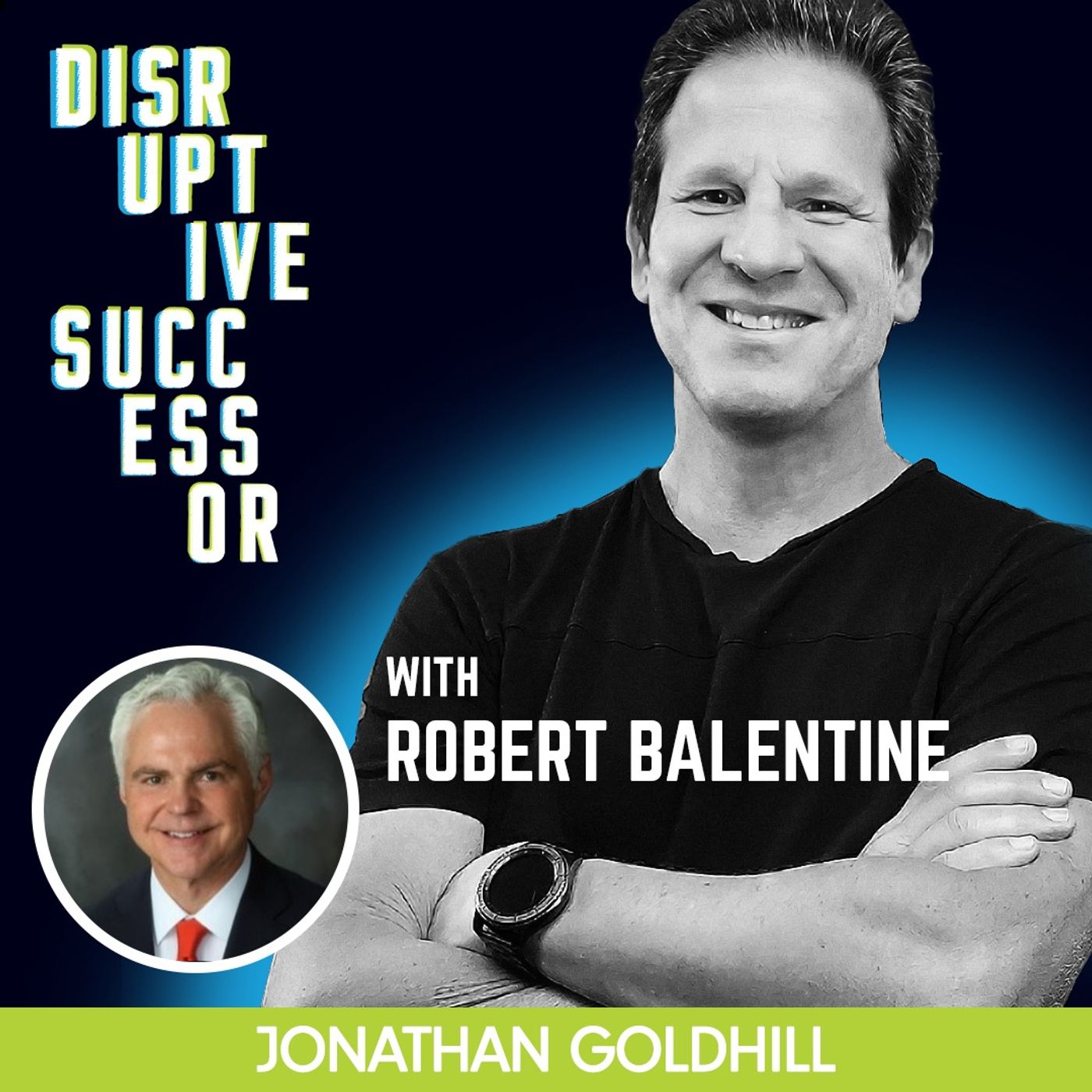
Episode 109 - Three Enduring Principles for Wealth, Family & Legacy with Wealth Manager Robert Balentine
In this episode of The Disruptive Successor Show, Jonathan speaks with Robert Balentine, the Chairman of Balentine, Founder of Southern Highlands Reserve, and Author of First Generation Wealth. Today, Robert discusses his book and the 3 principles to create enduring wealth, family, and legacy. Robert also digs into the phenomenon of going from shirtsleeves to shirtsleeves in 3 generations and how first-generation wealth builders can secure their legacy. In Robert's experience, generations who have been taught by parents with aligned mindsets and the opportunity to fail early fare make for better stewards of the business. He shares how he and his father started their business 50-50, the trials that followed, and the height they achieved after his father’s passing. Robert also comments on trust distributions where he also says that it is best not to be prescriptive and instead be discretionary where there is context and judgment. HIGHLIGHT QUOTESROBERT: The family business and the business of a family are 2 different things"We've got one client that we joke about years ago, said, I run my family meetings on Sunday nights around the dinner table like I run a board meeting. And his children are smart enough to understand that, so there's a difference in how you run a family business versus how you run the business of the family."ROBERT: The division of wealth among children must be fair, not equal"There's a difference between fair and equal. And a lot of people in family businesses, they think about I've got 3 children, a third, a third, a third. But what about the difference between what's fair versus what's equal? And we spend a lot of time in family meetings counseling families how to think through that."ROBERT: Good customer service is good business"He always said, son, if you worry about your client first and yourself second, you'll have people knocking on your door in 4, 5 years wanting to do business with you." Connect with Robert and get his book through the following links:About RobertWebsiteEmailBook If you enjoyed today’s episode, please subscribe, review and share with a friend who would benefit from the message. If you’re interested in picking up a copy of Jonathan Goldhill’s book, Disruptive Successor, go to the website at www.DisruptiveSuccessor.com
45:1725/01/2023
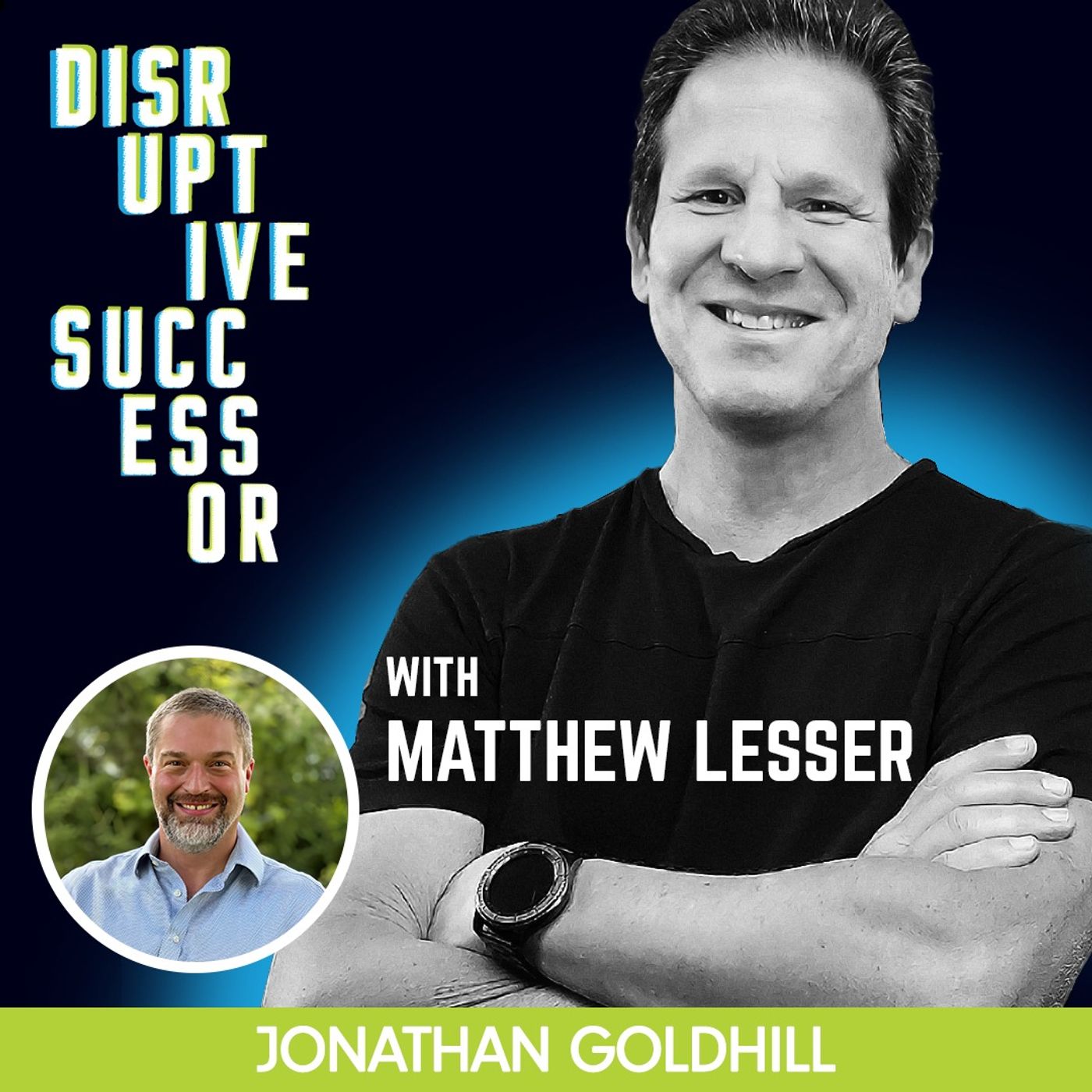
Episode 108 - Building Healthy Teams with Matt Lesser
In this episode of The Disruptive Successor Show, Jonathan speaks with Matt Lesser, the Founder, and CEO of Uniquely Normal and best-selling author of UnSatisfied. For over two decades, Matt has facilitated and trained leaders, teams, and boards of directors in dozens of countries on six continents.He has served in various C-suite roles in private equity, banking, and commercial uniform industries. He also launched and operated several businesses in the Midwestern petroleum industry.Matt shares how he learned that business is all about the people after his family business failed. He talks about taking those lessons to his practice and he talks about how he sits down with the teams he is working with and listens to their stories as a foundational aspect of understanding them.These one-on-one conversations, as well as assessments, are done with the intention of knowing what motivates team members and the ways they like to communicate. These are vital insights that can transform them into top-performing teams.Matt and Jonathan also discuss the need for boundaries. This can refer to respecting employees' time in a remote environment, as well as using family gatherings as a venue to talk business. HIGHLIGHT QUOTESMATT: Engaged teams require empathy, empowerment, and excellence"We're going to go from here to there, and how we get from here to there, I don't know. But we're going to get from here to there and, along the way, we are going to focus on 3 major areas—and they are empathy, empowerment, and excellence."MATT: Create boundaries during family gatherings about business"At the dinner table, this is a business-free zone. And we even put a policy in place where we put fines that if somebody said something about business, they were fined. And it went into this general fund for the family that we give away for charity."MATT: Remote teams must be more intentional about culture"It comes down to the word intentionality. And I think that's what it's going to take for organizations, especially those that continue to be remote if they want to have a healthy and connected and engaged organizational culture, they're going to have to be even more intentional than those that are face-to-face."Connect with Matt and get his book through the following links:About MattWebsiteEmailBookIf you enjoyed today’s episode, please subscribe, review and share with a friend who would benefit from the message. If you’re interested in picking up a copy of Jonathan Goldhill’s book, Disruptive Successor, go to the website at www.DisruptiveSuccessor.com
40:5717/01/2023
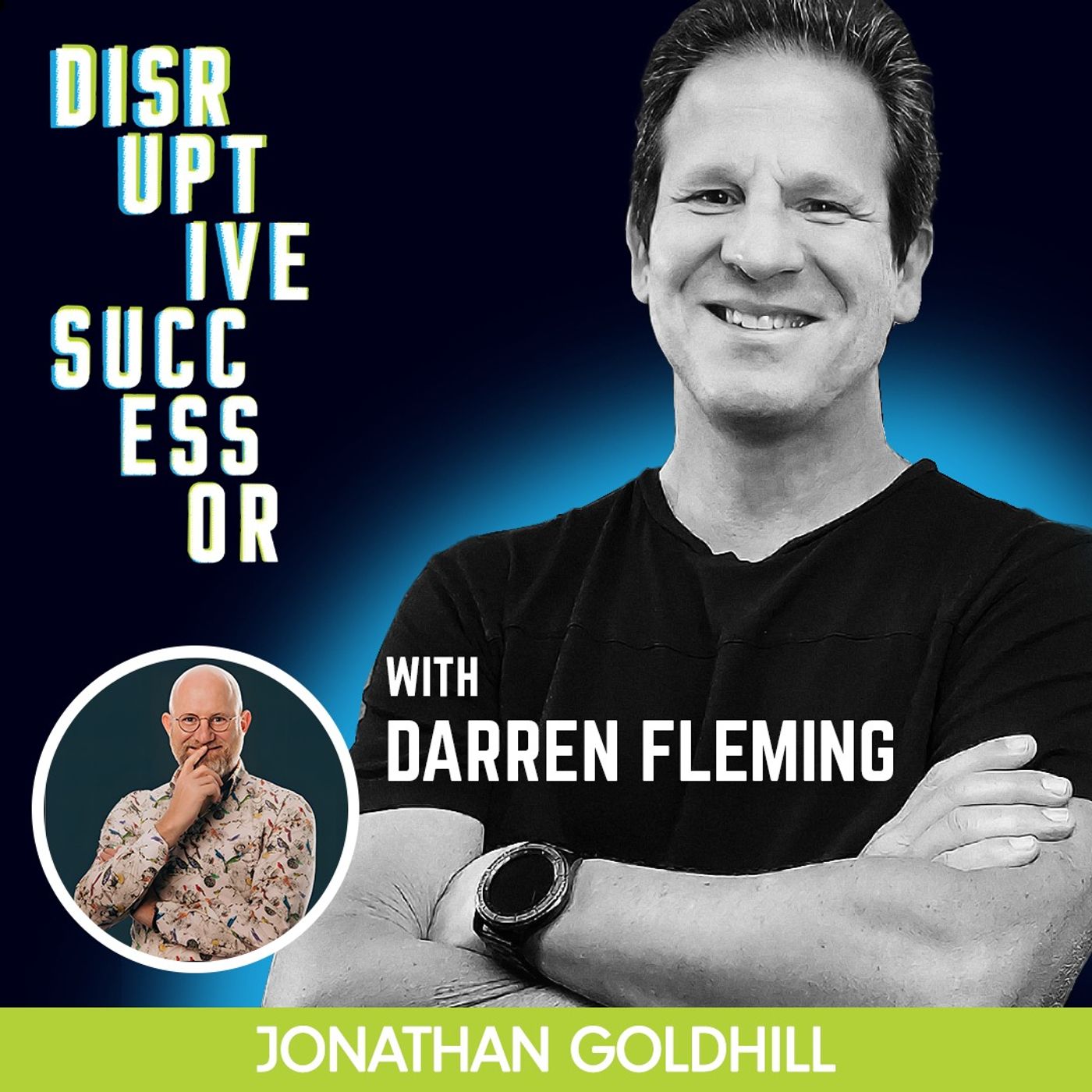
Episode 107 - Learn to Observe and Let Energetic Sensations Dissipate with Darren Fleming
In this episode of The Disruptive Successor Show, Jonathan speaks with Darren Fleming, behavioral scientist, author, trainer, and peak performance strategist for senior executives who helps teams remove blockages that prevent peak performance.He shares what energetic sensations are and how these can be the driving force behind decision-making. By honing your power of observation, you will be able to spot these and allow them to naturally dissipate, thereby allowing you to do the task you really need to do.What Darren teaches is a less difficult way of overcoming distractions. Instead of creating scaffolding to be able to power through difficult situations, he simply suggests removing what it is that makes the task difficult to get to the desired results.HIGHLIGHT QUOTESDARREN: Observe what makes you uncomfortable and let it dissipate"Most people will put scaffolding in place to go down the uncomfortable path. So they put an accountability coach such as yourself in place, a coach. If I don't do this, I've got to give a hundred dollars to charity and all this scaffolding to keep them on the path, to keep going down something that's uncomfortable." "Why don't we just get rid of what is making it uncomfortable? What is making it uncomfortable is not the task. The task is neutral. What is making it uncomfortable is your reaction to the task. So why don't we just let that dissipate?"Darren: Simply observe when slipping back into your comfort zone"What this does is it enables you, it helps build the skill of simply observing, of observation. The reason this is important is when you feel that energetic sensation rise within your body that would normally cause you to either avoid the CEO work or do the previous role's work, you need to be able to simply observe what is happening."Connect with Darren in the following links:About DarrenWebsiteIf you enjoyed today’s episode, please subscribe, review and share with a friend who would benefit from the message. If you’re interested in picking up a copy of Jonathan Goldhill’s book, Disruptive Successor, go to the website at www.DisruptiveSuccessor.com
33:0510/01/2023
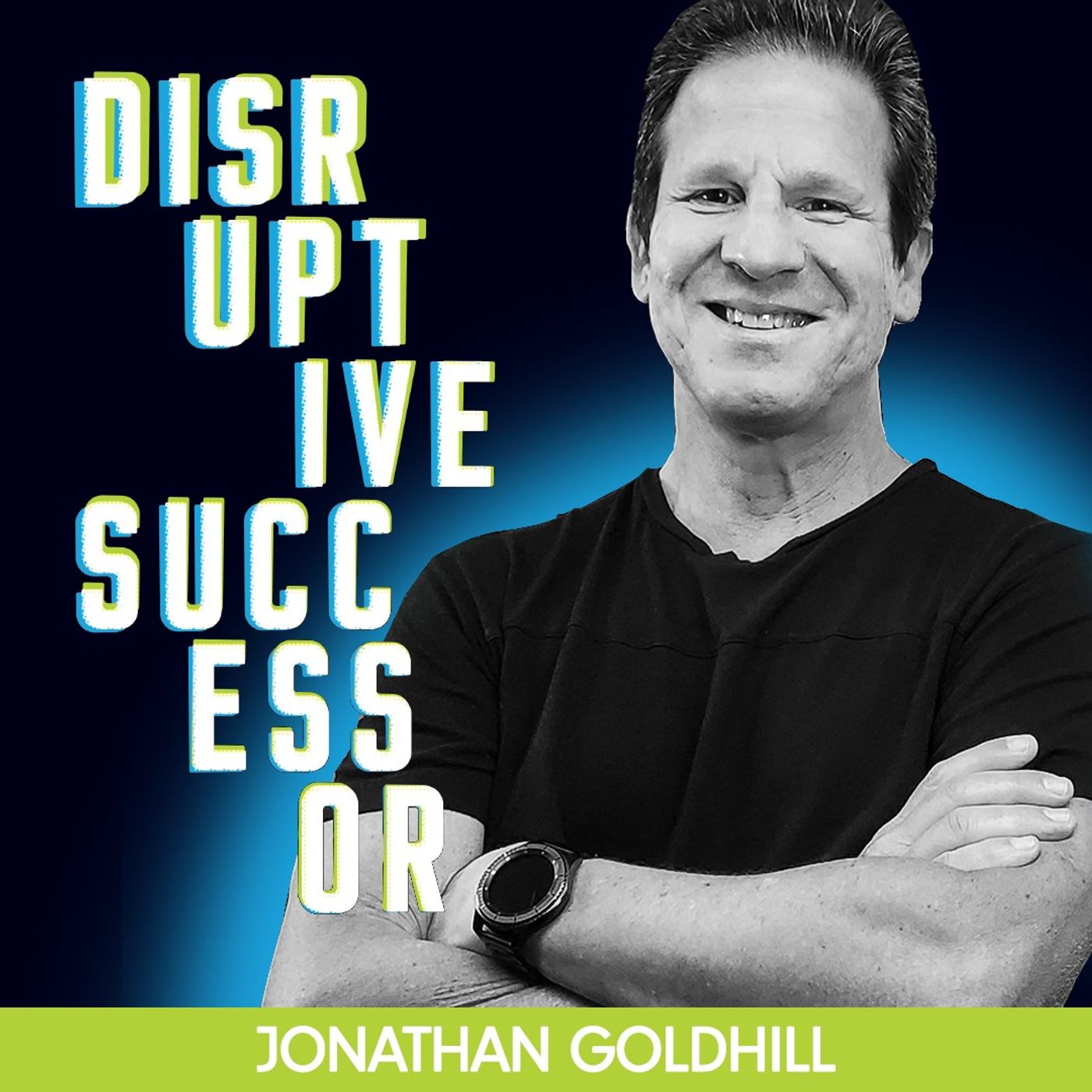
Episode 106 - Family Time, Holidays, It's a Wonderful Life (Part 2)
In this holiday episode of The Disruptive Successor Show, we sit back and recall some of the most impactful moments with our esteemed guests. We bring you more of the best insights, lessons, and strategies from these disruptive successors that we sat down with last year in 2022:Bill Yoh - Chairman of the Yoh Group and Co-Owner of Day and ZimmermanJeff Jappa - CEO and President of JMC Wood Manufacturing (formerly Jappa Construction Company) Avi Arya - Founder of Internet Moguls Nick Gray - Founder of Museum Hack and Best-Selling Author Phelps Wood - Advisor, Executive, and Director with a Family Business Focus Bobby Marchenese, Owner and President of Auto Wash Bill Smith, Founder at Double Iron Consulting Richard Grove, COO for Wall Control, Inc. Ryan Margolin, CEO of Professional Hair Labs Chris Lonergan, President of Communication Partners and CEO at BenefitElectHillary McPartlon, Chief Executive Officer of McPartlon Roofing and Chair at the National Women in Roofing - New MexicoScott Lesak, Owner of Kasel Rocks Landscape CompanyJustin White, CEO of K&D Landscaping, Inc.Jenny Dineen, Co-Owner and Chief Ideation Officer & Futurist at MacKenzie CorporationNike Anani, Speaker, Author, Legacy Planning Consultant, NextGen Coach, and Family Meetings FacilitatorHeidi Ellsworth, President of RoofersCoffeeShop® and HJE ConsultingBen & David Grossman, Co-Presidents at Grossman Marketing Group Sean Salas, CEO of Camino FinancialKen Monroe, President of HOLT of CaliforniaChristy Crook, Founder, and President of Phoenix Masonry Inc.Craig Bundren, Founder of the Bundren Building Arts Foundation Trey Taylor, Managing Partner at ThreadneedleAmber Famminio, Chief Operating Officer at Umina Bros. Inc Mitzi Perdue, Founder of the Win This Fight! Stop Human Trafficking If you enjoyed today’s episode, please subscribe, review and share with a friend who would benefit from the message. If you’re interested in picking up a copy of Jonathan Goldhill’s book, Disruptive Successor, go to the website at www.DisruptiveSuccessor.com
26:1104/01/2023
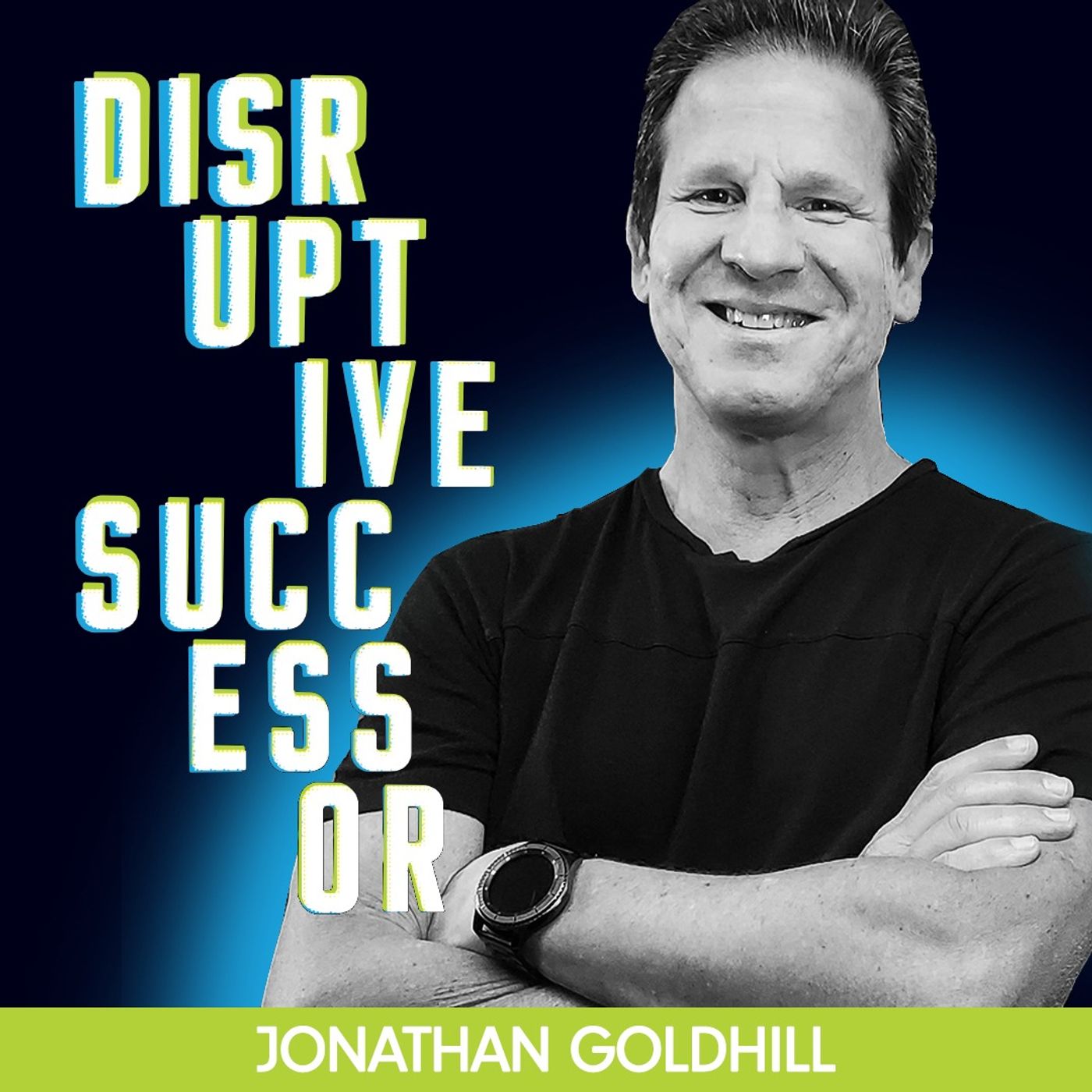
Episode 105 - Family Time, Holidays, It's a Wonderful Life
In this holiday episode of The Disruptive Successor Show, we sit back and recall some of the most impactful moments with our esteemed guests. You’ll hear the best of the best insights, lessons, and strategies from disruptive successors from all industries and levels of growth: Bill Yoh - Chairman of the Yoh Group and Co-Owner of Day and ZimmermanJeff Jappa - CEO and President of JMC Wood Manufacturing (formerly Jappa Construction Company) Avi Arya - Founder of Internet Moguls Nick Gray - Founder of Museum Hack and Best-Selling Author Phelps Wood - Advisor, Executive, Director with a Family Business Focus Bobby Marchenese, Owner and President of Auto Wash Bill Smith, Founder at Double Iron Consulting Richard Grove, COO for Wall Control, Inc. Ryan Margolin, CEO of Professional Hair Labs Chris Lonergan, President of Communication Partners and CEO at BenefitElectHillary McPartlon, Chief Executive Officer of McPartlon Roofing and Chair at the National Women in Roofing - New MexicoScott Lesak, Owner of Kasel Rocks Landscape CompanyJustin White, CEO of K&D Landscaping, Inc.Jenny Dineen, Co-Owner and Chief Ideation Officer & Futurist at MacKenzie CorporationNike Anani, Speaker, Author, Legacy Planning Consultant, NextGen Coach, and Family Meetings FacilitatorHeidi Ellsworth, President of RoofersCoffeeShop® and HJE ConsultingBen & David Grossman, Co-Presidents at Grossman Marketing Group Sean Salas, CEO of Camino FinancialKen Monroe, President of HOLT of CaliforniaChristy Crook, Founder and President of Phoenix Masonry Inc.Craig Bundren, Founder of the Bundren Building Arts Foundation Trey Taylor, Managing Partner at ThreadneedleAmber Famminio, Chief Operating Officer at Umina Bros. Inc Mitzi Perdue, Founder of the Win This Fight! Stop Human Trafficking If you enjoyed today’s episode, please subscribe, review and share with a friend who would benefit from the message. If you’re interested in picking up a copy of Jonathan Goldhill’s book, Disruptive Successor, go to the website at www.DisruptiveSuccessor.com
23:4828/12/2022
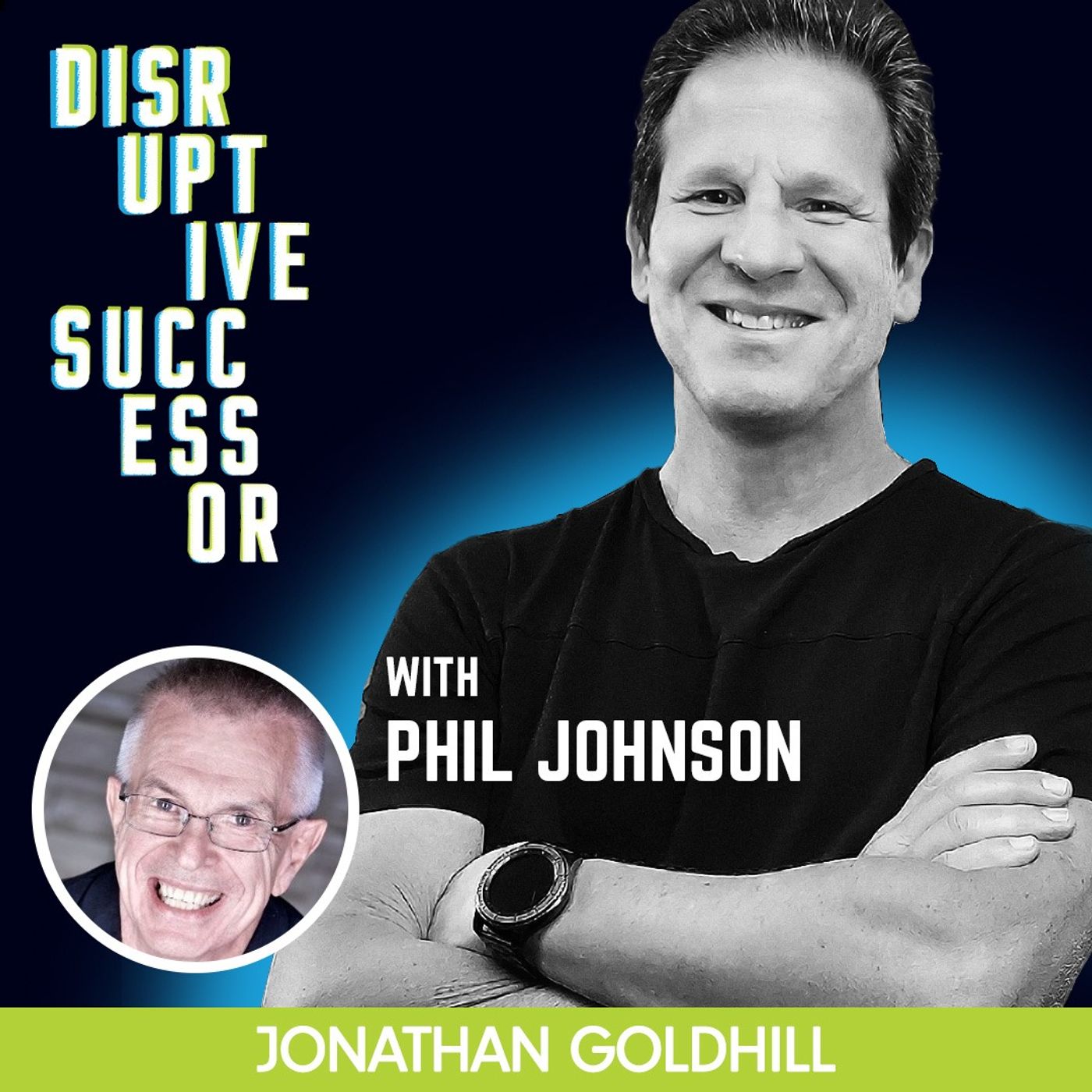
Episode 104 - Why Emotional Intelligence Matters More Than You Think with Phil Johnson
In this episode of The Disruptive Successor Show, Jonathan speaks with Phil Johnson, Founder of Master of Business Leadership Inc. Emotional intelligence is the ability to feel the fear and anxiety that changing innovation triggers in us and move through it towards what it is we're trying to achieve, as opposed to allowing that fear and anxiety to keep us trapped in our comfort zones.This definition is different from what most people think emotional intelligence is, which is the ability to read people and sense where they are coming from. However, both definitions are important in different ways. Phil explains that emotional intelligence can be developed and concludes that the benefits of doing so are immense. It can be compared to the growth of a penny doubling in value every day, which grows exponentially.The development of emotional intelligence is an important process that actually guarantees that individuals be successful in their careers and personal lives. Emotional intelligence is based on actions and experiences, and cannot be simply learned by reading or having conversations. Phil emphasizes the idea that emotional intelligence is more important than intellectual intelligence. Emotional intelligence is the ability to understand and manage emotions. It is important because it allows people to inspire others, make them feel safe, and manage their own emotions, an important quality for leaders to successfully lead their teams.He discusses the 3 primary sources of resistance that people need to change to develop emotional intelligence, with 2 being biological and 1 sociological: the amygdala, existing habits, and other people not wanting us to change. Phil teaches that unless a person has an emotional connection to the desired outcome that is greater than their fear, they will never leave their comfort zone and fall short of developing their emotional intelligence. HIGHLIGHT QUOTESPHIL: Emotional intelligence is developed through experiences"A development of emotional intelligence is an experiential process, so in other words, you can't develop emotional intelligence by having a conversation or reading a book or watching a video. Those are intellectual processes. The development of emotional intelligence is based on what you do. As a matter of fact, what you do will change what you think. Thinking doesn't change doing. Doing changes thinking."PHIL: Emotional intelligence development requires a desire for change that is greater than your fear"Unless you have an emotional connection to the desired result that's stronger than your fear, you won't be willing to do the emotional labor required to get those benefits. And quite frankly, most people don't have that level of emotional connection or pain to achieve better results."Connect with Phil and book a call with him in the following links:About PhilZoom calendarMBL Executive Alumni VideosIf you enjoyed today’s episode, please subscribe, review and share with a friend who would benefit from the message. If you’re interested in picking up a copy of Jonathan Goldhill’s book, Disruptive Successor, go to the website at www.DisruptiveSuccessor.com
37:3220/12/2022
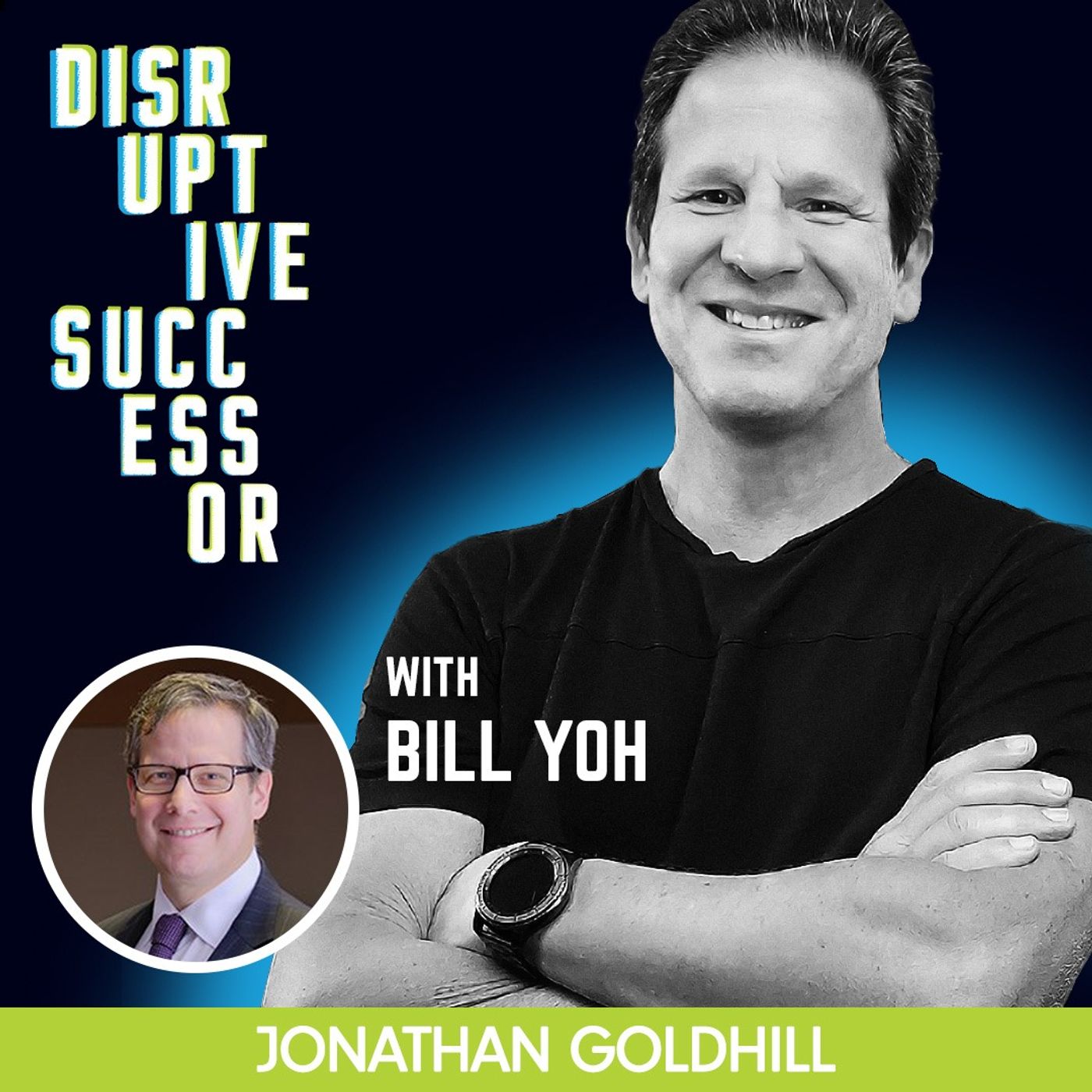
Episode 103 - Bill Yoh Talks about Leadership of His Family's 45,000-Employee Company
In this episode of The Disruptive Successor Show, Jonathan speaks with Bill Yoh, Chairman of the Yoh Group and Co-Owner of Day, and Zimmerman, a 45-thousand-employee, century-old business. He is a third-generation owner and the youngest of 5 siblings and has a personal view of the human dynamics behind large, multigeneration family businesses.He regularly writes about leadership, relationships, and family business using his proprietary methodology called famlylitics. He recently published Our Way, a biography on his father and family which has been hailed as a transgenerational saga. Bill also teaches a class at Wharton on the family business.He talks about how his father grew their business, being G2, and how even being G3 it is still more of a sibling partnership than anything. Succession was smooth in their business and they ensure that any family members who want to enter the business have had related experience first before coming aboard.In their experience, having outside consultants is critical to find out what others have been doing and going through that process first before landing on policies on hiring and governance. Bill stresses the need to nurture the relationships within the family business and how consultants can help with this.Bill's family has a master plan that they discuss when things are good so that when unexpected events happen, they are not blindsided. Bill then shares the genesis of his book on his father and how it was an effort to immortalize the rich lessons in life and business that his father learned over many decades.HIGHLIGHT QUOTESBILL: Work with external advisors as a group "For our experience, where we landed on say our employment policy or our governance model, whatever else, is really not as important, in my opinion, to other people as the process, as going through the process as an ownership group, with or without management, intergeneration or not, whatever your dynamics are, going through that process as a group is, to me, more important than whether you land on, you have to work outside the business for 2 years of 5 years."BILL: A disruptive successor must drive how the succession looks like"There are literally an infinite number of ways that succeeding generations can succeed the incumbent generation, but of that infinite number of ways, the only one I can say with certainty that will not work is one that the incumbent generation designs for the succeeding generation. That succeeding generation has to not just participate but has to drive what that succession process looks like."Connect with Bill and get his book with the following links:About BillWebsite (Personal)Website (Company)If you enjoyed today’s episode, please subscribe, review and share with a friend who would benefit from the message. If you’re interested in picking up a copy of Jonathan Goldhill’s book, Disruptive Successor, go to the website at www.DisruptiveSuccessor.com
48:5513/12/2022
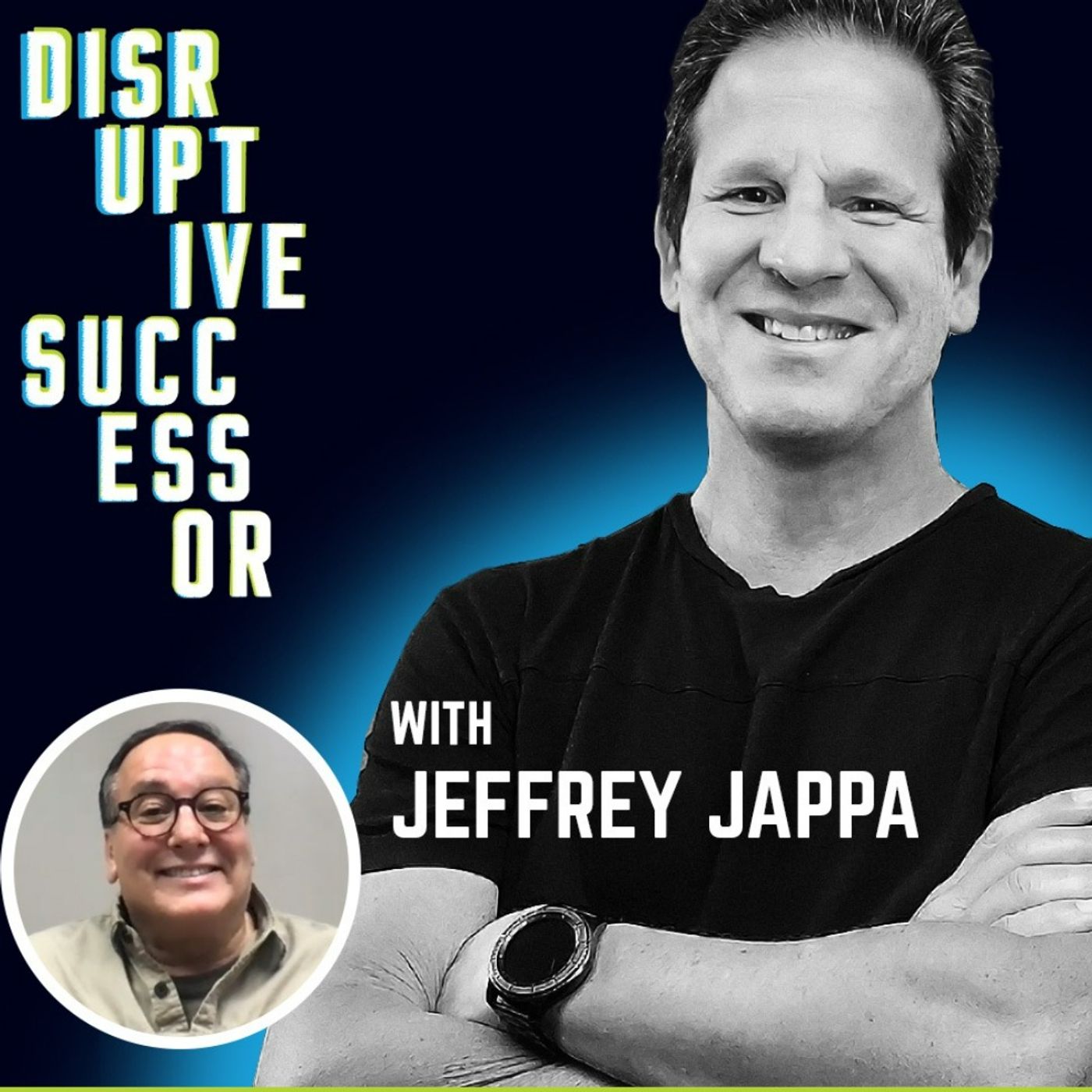
Episode 102 - Manufacturing Entrepreneur and Family Business Owner Fires His Family After Getting Fired - The True Story of Jeffrey Jappa's Company
In this episode of The Disruptive Successor Show, Jonathan speaks with Jeffrey Jappa, the CEO and President of JMC Wood Manufacturing (formerly Jappa Construction Company). Jeffrey's father started Jappa Construction in 1972. His father, being a handyman by trade, decided to enter industrial manufacturing. At the time his father started the business, Jeffrey was only twelve years old. His father shared the factory space with another factory which became his sole customer. He would run the business at night, after the client company's regular business hours. Jeffrey describes how his father ran the factory and sometimes he and his buddies would help out. One of his fond memories as a teenager is taking out his father's houseboat at Alton Lake. This experience is similar to what many of Jonathan's clients go through as they take over family businesses and work to improve them.Jeffrey would eventually fall in love and start his own family and he decided to go out and try his own path first. However, by the age of 31, he decided to go back home and raise his family in the midwest. He entered the business at a time when his father wanted to quit it already, but this was just the beginning of his problems.Working for his father was a nightmare. He was erratic and would blame Jeffrey for problems that he did not cause, even citing instances like getting a pay cut when there was no real justification for it.However, seeing that their company was getting lots of inquiries but no business, he decided to lower their prices to capture more business. From there, he would add value through additional services. This business strategy was helpful during critical times in Jeffrey's career.Eventually, his gambler of a brother was brought into the family business at Jeffrey's father's insistence and against Jeffrey's wishes. In a few years, Jeffrey asked for stock options knowing that the company would eventually become his. The catch was that his brother would get stocks too.Jason would wear Jeffrey down and Jeffrey would eventually give his father an ultimatum: choose one to run the business. Against all his expectations, Jeffrey's father fired him. A few cold years pass of no communication, then his father reconnected in 2003 and informed him that Jason, unsurprisingly, was found to be stealing from the company.Jeffrey came back and found out that from making 6 million a year, they went back to sub 2 million and his father was losing $10,000 a month to Jason. Jeffrey bought the company at this point. In 4 years, he was able to bring the company back to the $6 million mark.He shares how he invented a subway-looking tile that wasn’t a subway tile and how this project, which was expensive, attracted the attention of buyers and became a commercial success. Last year alone, Jeffrey made $23 million.HIGHLIGHT QUOTESJEFFREY: Entering a family business is a practical way for entrepreneurship"The easiest path to getting to what my goals were over time I learned was really through my dad's business. It's really tough to start stuff on your own and finding ideas and money and capital. And so, when you got a goal of running and owning your own business and there's one in the family, I realized that would be a good path."JEFFREY: Lower margins for a commoditized product win business"I don't necessarily need high margins. I need cash. And so, the first thing I did, and I'll be honest with you, I've repeated this 2 or 3 times during my career when things have started to go the wrong way, and that is lower my margin and win business."JEFFREY: Reviving the fledgling business back to profitability"I found out that during the time I was gone, my brother brought in 0 customers. Business went from $6.8 million back to under $2 million. And my dad was losing $10,000 a month. And that's when he called me. Gee, you could have called me a little sooner, dad. So I came back and eventually, he would tell me couldn't afford me and this and that... and I said, well then, just let me buy the company." Connect with Jeffrey in the following link:About JeffreyIf you enjoyed today’s episode, please subscribe, review and share with a friend who would benefit from the message. If you’re interested in picking up a copy of Jonathan Goldhill’s book, Disruptive Successor, go to the website at www.DisruptiveSuccessor.com
52:4206/12/2022
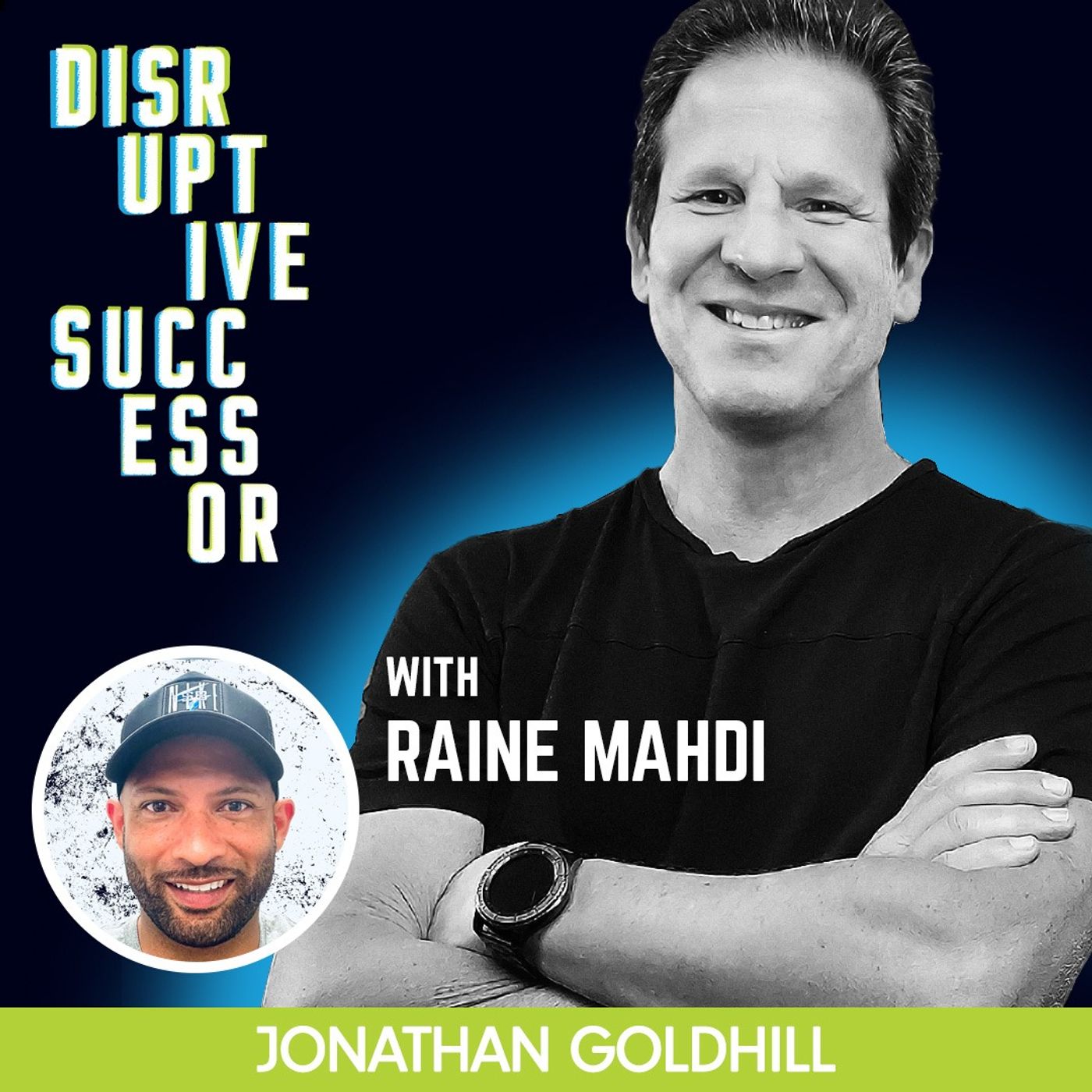
Episode 101 - Serial Entrepreneur Raine Mahdi on Childhood, Entrepreneurship, and Global Product Sourcing
In this episode of The Disruptive Successor Show, Jonathan speaks with lifelong entrepreneur Raine Mahdi, the Founder of Zipfox.com, as he shares his early exposure to entrepreneurship through the lessons of his parents, particularly his mother.Raine grew up in San Diego, where his father's brother was managing Muhammad Ali's business. His mother, on the other hand, took a journey to the United States from Iran which itself was an entrepreneurial story.He witnessed the radical transformation of his mother, who went from living on welfare to cashing in checks and proudly showing the envelope packed with hundred dollar bills. She taught him the lesson that nobody is limited by their circumstances and that you can go from welfare to wealthy with hard work.Raine talks about how his mom always encouraged him and made him believe in his ideas and business goals. He shares his first experience with arbitrage, his favorite way of selling when his mother taught him that he could buy a dozen donuts and sell them at school for a profit. This taught him that he could sell something and create demand.Raine describes his other early experiences as an entrepreneur and notes that he has always been interested in a lot of different things, a curiosity that has helped him become a successful entrepreneur. He also discusses how execution is a challenge for many entrepreneurs, and how he has always been a great taskmaster in getting things done.From being a young entrepreneur, Raine went on to reinvent dropshipping 13 years ago by connecting his love for arbitrage to the biggest suppliers in the world in China. Since then, Raine has gone on to grow Zipfox.com, the world's first global product-sourcing platform, and how he opened up trade to the US through Mexico.Raine explains that choosing between suppliers in China and Mexico requires a more profound look beyond the cost of the goods themselves. Now, what matters is geopolitical risk and shipping cost, as shipping from Mexico will be just a third of the shipping from China.Establishing norms around fair compensation is also at the heart of Raine’s business and he stresses the need for fair practices because companies that abuse this will not get away with it for far longer. HIGHLIGHT QUOTESRAINE: Seeing his mother rise from welfare to wealthy was critical"You're not bound by your circumstances. You can change your circumstances. I don't think I consciously thought that at a young age, but looking back, I did connect those dots that like, wait, we were struggling, now we're not. She worked really hard. You don't have to accept your circumstances. And that's critical, that's key to everything I do."RAINE: Take your idea and sell it to yourself first before anybody else"You start to realize, you have to know what ideas to sell yourself. The first person you have to sell on is yourself, and so now I'm a tougher sale than I used to be. Now, when I hear an idea or I think of an idea obviously, I'm vetting it better."RAINE: Sourcing from China, Mexico, or the US is about choosing the right supplier"You can find the whole spectrum of quality in China, and the whole spectrum of quality in Mexico, and the whole spectrum of quality in the United States as well. So it's really not a question of is, all-encompassing, is Mexico low quality or high quality, or China, or the US? It's how are you going about vetting the proper supplier?"RAINE: Grow your business by accessing talent from all over the globe"There is nothing that is more landscape-changing and pivotal than the introduction of the global talent pool and the access to that. It is a gold rush. It is a game-changer, and especially for small businesses." Connect with Raine in the following links:About RaineZipfox.ComIf you enjoyed today’s episode, please subscribe, review and share with a friend who would benefit from the message. If you’re interested in picking up a copy of Jonathan Goldhill’s book, Disruptive Successor, go to the website at www.DisruptiveSuccessor.com
58:4829/11/2022
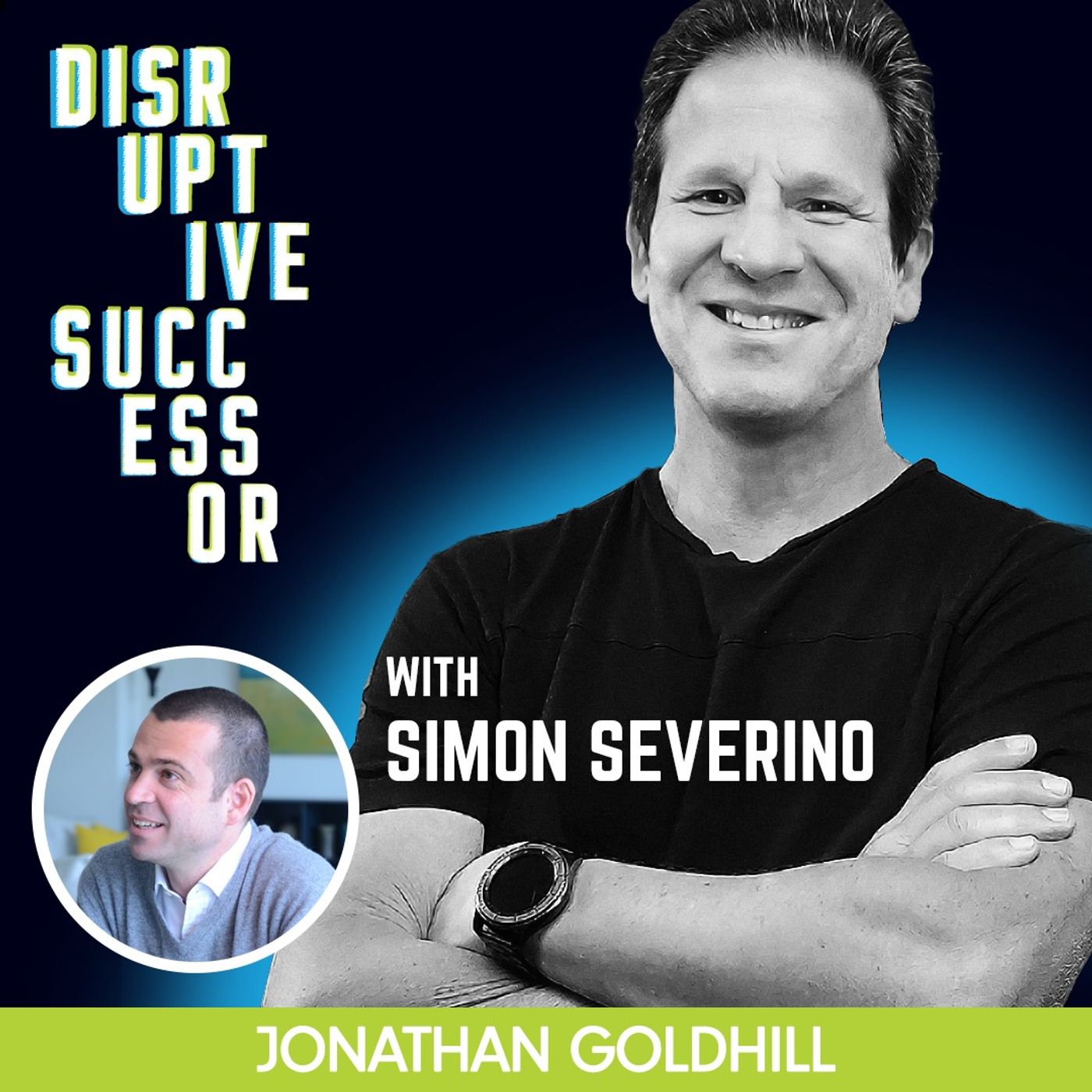
Episode 100 - 3 Habits for Leaders Using Strategy Sprints for Rapid Growth with Simon Severino
In this episode of The Disruptive Successor Show, Jonathan has an insightful conversation with Simon Severino, the business strategy advisor behind the Strategy Sprint Method. This method teaches you how to double revenue in 90 days and is his way of creating a primary series that helps digital businesses.In this conversation, Simon discusses the top 3 CEO habits for rapid growth: daily habit, weekly habit, and monthly habit. Understand that 95% of things are out of your control, so focus instead on the 5% that you CAN control.Simon also discusses his background in business consulting and how he became interested in helping businesses scale up. Simon's love for strategy led him to become a go-to-market advisor. He talks about how the good things in life are evergreen, with yoga being a perfect example of this. His advice to disruptive successors and family businesses is to focus on trying to improve their business by 1% every day. To do this, they should simplify their activities and focus on one process and one project at a time. Simon breaks down the value creation process into awareness, interest, engagement, closing, delivering, and retaining. To double revenue, you have to clean up this process first and then focus on the top 3 things that move you forward, such as commanding 25% more price, increasing 25% conversion rate, and 25% more sales frequency.The bottleneck theory is used to improve the overall throughput. The idea is that everyone should focus on one project at a time and make incremental improvements to unblock bottlenecks. HIGHLIGHT QUOTESSIMON: Break down the value creation process into 6 areas of focus"Let's say you have just one process right now, and the process is made of six pieces, the basic value creation of your business. Let's call it awareness, interest, engagement, closing, delivering, retaining. Let's say your business is made of these 6 pieces, which, usually businesses are made of these 6 pieces."SIMON: Find the bottleneck to improve overall throughput"If you improve everything a little bit, you are spread too thin, you do not really move the overall throughput forward. But if you just remove the bottleneck, think of a traffic jam, and there is this one traffic jam point, if you just really improve that, then all cars can flow again. That's the bottleneck theory."Simon: Explaining the 3 top habits of CEOs"I can control my daily habit, weekly habit, monthly habit. My daily habit is I write down how did I allocate my time today, and then I ask myself, what will I delegate or automate tomorrow? The weekly practice is, are we moving in the right direction, at the right pace?"SIMON: Double revenue by focusing on these 3 things"It's just going through all the activities and focusing on the things that move 3 things forward. Increasing by 25% your conversion rate, that means same amount of conversations with people but you close 25% more. So no marketing needed, just better closing technique... Then we want to increase by 25% the price that you can charge for the same thing." Connect with Simon and get his book in the following links:About SimonStrategySprints.comAmazonIf you enjoyed today’s episode, please subscribe, review and share with a friend who would benefit from the message. If you’re interested in picking up a copy of Jonathan Goldhill’s book, Disruptive Successor, go to the website at www.DisruptiveSuccessor.com
48:4423/11/2022
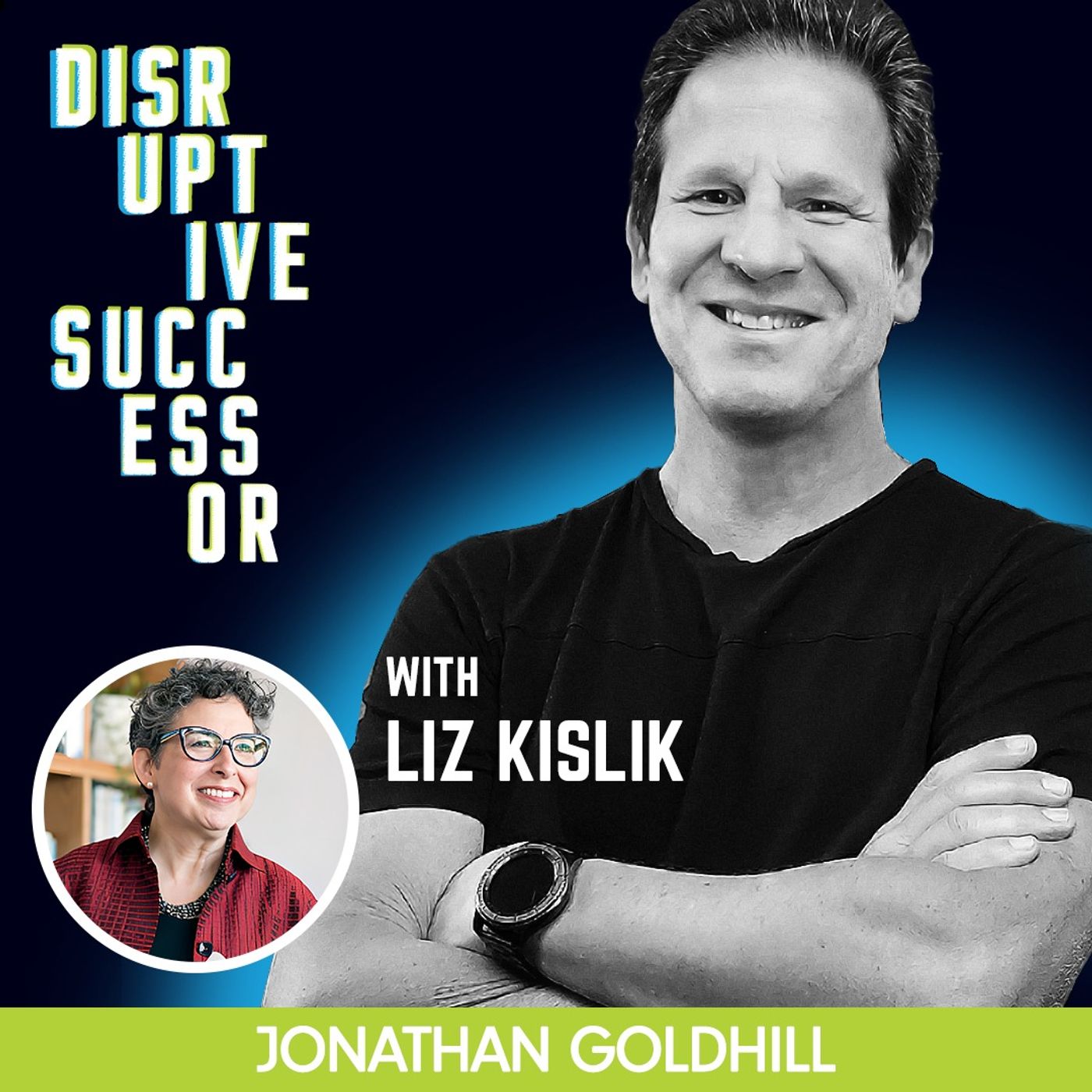
Episode 99 - Talking about Conflict at Work in Family Businesses with Liz Kislik
Contrary to what we might observe, it's not always clear that there's conflict in the workplace. We might witness a scene when things fall apart but there are many factors before then that can be addressed to actually stop that conflict from happening! In this episode of The Disruptive Successor Show, Jonathan has an insightful conversation with Liz Kislik, President of Liz Kislik Associates, on why there's so much conflict at work. She also talks about handling conflict in family businesses and what leaders can do best. HIGHLIGHTSWhy is there so much conflict at work?How conflict is different in family businessesThe damage that conflict and conflict avoidance does in the workplaceMaking sure generational transitions are done successfullyOn Liz's TEDx Talk and who should watch itQUOTESLIZ: Why the leader needs to communicate and embody safety“I don't think leaders provide trust. I think they can provide safety. But trust is something we bring ourselves based on our own experiences. There are people who never will trust. It doesn't matter who they work for, it doesn't matter how you go out of your way. Some people can't do it."LIZ: Leadership now moves away from "command and control"“Now that we expect collaboration, that's a whole other ball game. Because you have to be able to get along to collaborate and you have to be able to disagree. Otherwise, the collaboration may look nice and sound nice, but it may not accomplish anything because if everybody had the same opinion, you can't make much change when you need it." Connect with Liz and learn more about her work:About LizLizkislik.comIf you enjoyed today’s episode, please subscribe, review and share with a friend who would benefit from the message. If you’re interested in picking up a copy of Jonathan Goldhill’s book, Disruptive Successor, go to the website at www.DisruptiveSuccessor.com
46:4408/11/2022
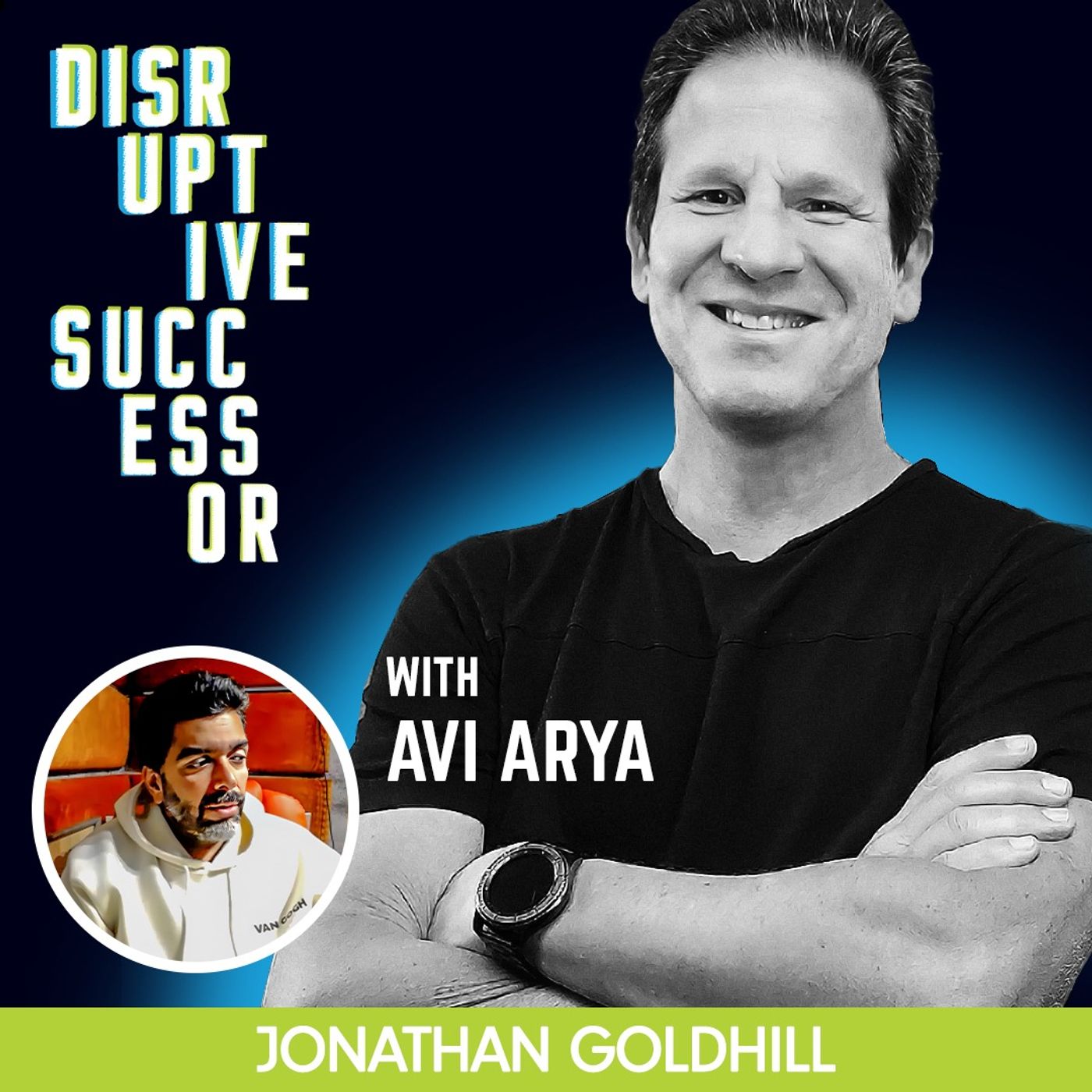
Episode 97 - Talking with Disruptive Successor Avi Arya - Hotelier turned Internet Mogul Entrepreneur
DISRUPTION IS NOT ALWAYS ABOUT MAKING CHANGES WITHIN, IT’S ALSO ABOUT DISRUPTING YOUR ENTIRE PATH COMPLETELY AWAY FROM THE TRADITIONIn this episode of The Disruptive Successor Show, Jonathan welcomes Avi Arya, a former hotelier and now businessman who found success in breaking away from the family business and taking his own path at the dawn of the internet age. Join them and tune in to learn about how Avi faced adversities in his journey and how he disrupted the course of his career to the next level. HIGHLIGHTSIntroducing Avi AryaAvi’s humble beginnings with the internetWriting a blog around India to travel and getting trafficHow do you know you can do it when you don’tThe struggle between the rich and the affluent and how to get out of the family businessThe challenges of working with hybrid business models.QUOTESAVI: Take time to work on your realization“Obviously, any plan that you want in life cannot be executed, realization is just one step, you need time after the realization as well.”JONATHAN: Talk about business models“It's no longer about WFH, which is work from home because that's an old thing. It's WFA, it's work from anywhere or working abroad. So yeah, so travel has been such a big part of my life.” Connect with Arya and find out more about him and his work:Avi Arya on LinkedInConnect with Jonathan and learn more about his work:Jonathan Goldhill | The Goldhill Group | Contact GoldhillGroup.comIf you enjoyed today’s episode, please subscribe, review and share with a friend who would benefit from the message. If you’re interested in picking up a copy of Jonathan Goldhill’s book, Disruptive Successor, go to the website at www.DisruptiveSuccessor.com
48:2126/10/2022

Episode 96 - New Developments at Goldhill Group and Disruptive Successor Show
SOMETHING NEW IS ABOUT TO DISRUPT THE SYSTEMIn this episode of The Disruptive Successor Show, Jonathan goes solo as he is about to bring us exciting news. Jonathan introduces us to new tools that can disrupt your business and push you to growth. Tune in as Jonathan calls out to family businesses and disruptive entrepreneurs to join him on the show and share their best practices and innovative ways. HIGHLIGHTSIt's time to slow downA call out to family businesses and disruptive entrepreneursJonathan's travels and new venturesIntroducing the Goldhill Growth Checklist and 7 Ps Fillable ToolQUOTESJonathan: Slowing down and a call out to disruptors“I'm finally slowing down, I think perhaps we're heading into fall, I'm no longer backlogged by two months on my podcast, and that's probably because I'm being more selective about who I take on the show. Actually, this is a call out to family businesses, and disruptive entrepreneurs in general, I'd like to invite you to come on my show and tell your story.”Jonathan: Inviting disruptive entrepreneurs to the show“Disruptive entrepreneurs have something to teach all of us their new way of thinking, and their innovative way of approaching the market. Hopefully, they've got a product or service that can scale and that we can all learn something from.” Connect with Jonathan and learn more about his work:Jonathan GoldhillThe Goldhill GroupContact GoldhillGroup.comIf you enjoyed today’s episode, please subscribe, review and share with a friend who would benefit from the message. If you’re interested in picking up a copy of Jonathan Goldhill’s book, Disruptive Successor, go to the website at www.DisruptiveSuccessor.com
12:0319/10/2022

Episode 95 - A SEPTEMBER TO REMEMBER: The Disruptive Successor September Highlights
IT WAS TRULY A SEPTEMBER TO REMEMBER. From transitions to doing good, to mindset, to leadership, we will deliver you the best moments of our guests for September 2022. Tune in and learn more from the great minds of Laurie Barkman, Bessi Graham, Tony Child, and Don Schmincke, only here, in the latest episode of The Disruptive Successor Show. DISRUPTIVE HIGHLIGHTSBusiness Transition Advisory Discussion with Laurie BarkmanHow Does Doing Good and Doing Well Go Together with Bessi GrahamElevate Your Mindset, Success, and Gratitude with Tony ChildBusting Myths on Leadership with Author Don SchminckeIf you enjoyed today’s episode, please subscribe, review and share with a friend who would benefit from the message. If you’re interested in picking up a copy of Jonathan Goldhill’s book, Disruptive Successor, go to the website at www.DisruptiveSuccessor.com
09:5611/10/2022
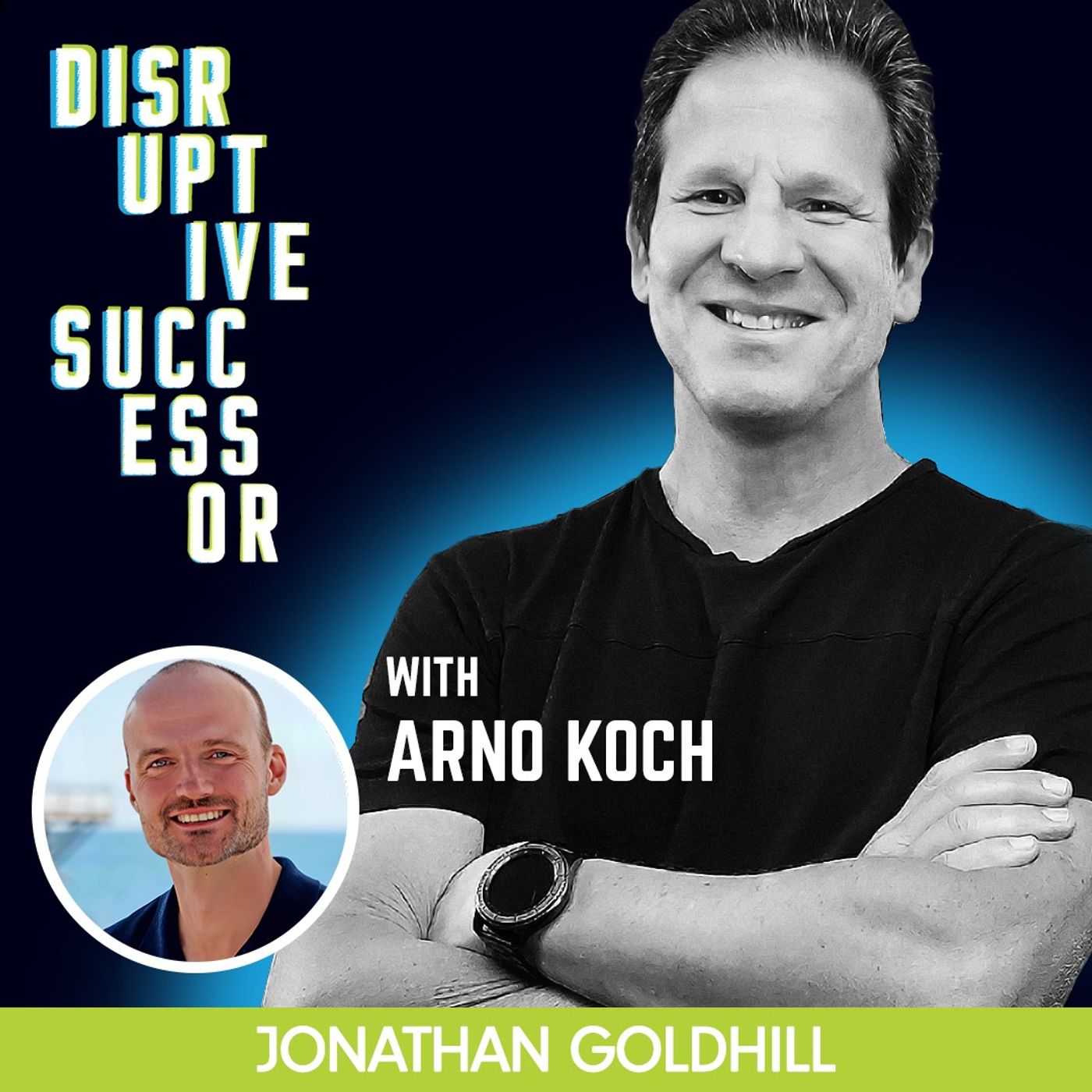
Episode 94 - Healthy Interpersonal Relationships at Work with Arno Koch
IT’S NOT THE JOB THAT PEOPLE QUIT FROM, IT’S EITHER BAD LEADERS OR BAD CULTURE.In this episode of The Disruptive Successor show, Jonathan welcomes Arno Koch, CEO, and Founder of Imagine Evolution LLC, and they will be discussing the importance of having healthy interpersonal relationships at work. Arno will be sharing his experiences and how his company helps leaders and other companies build a healthier environment for their employees. HIGHLIGHTSIntroducing Arno KochThe four horsemen of damaging communicationHow leaders shape the culture of the companyWhat motivates peopleThe four sub-states of being and the ripple effectHow to influence the corporate environmentHow to measure the success of your teamQUOTESArno - Leaders shape the culture of the company:“Blaming people for things, right and being contemptuous thinking, ‘Oh, I'm just better than that person and letting them feel it’. And if the leadership or part of the leadership team exercise[s] those behaviors, that trickles down, because if you want it or not, the leaders shape the culture of the company and have a bigger effect, and some might acknowledge.”Arno - Dependence can bring autonomy:“The more someone can effectively depend on another person, the more autonomous that person becomes, because he knows it’s the safe harbor that they can always go to, and they don't need to be afraid that I make any mistakes.” Connect with Arno and learn more about his work:About ArnoAbout Imagine Evolution LLCImagine Evolution LLC WebsiteIf you enjoyed today’s episode, please subscribe, review and share with a friend who would benefit from the message. If you’re interested in picking up a copy of Jonathan Goldhill’s book, Disruptive Successor, go to the website at www.DisruptiveSuccessor.com
46:4704/10/2022
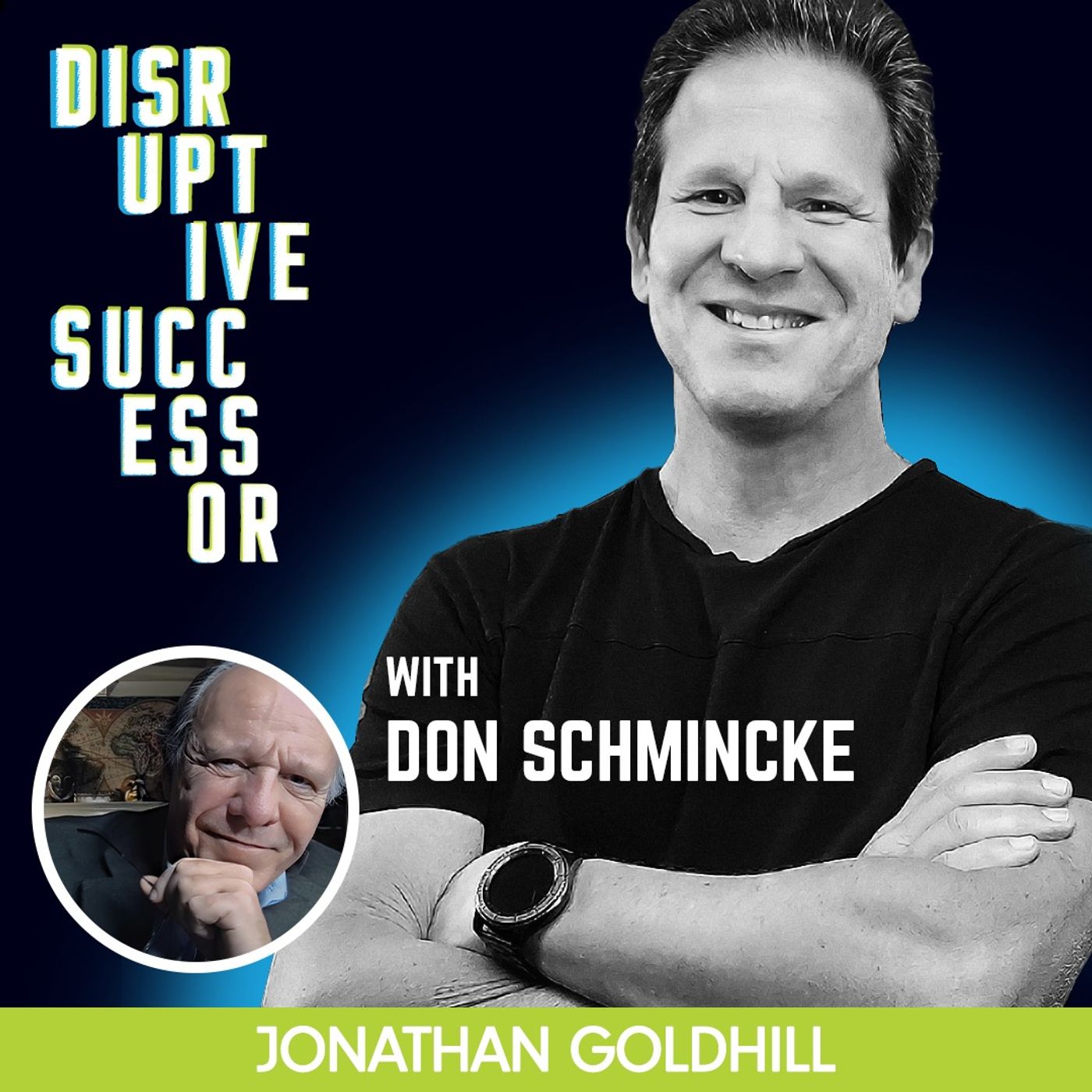
Episode 93 - Busting Myths on Leadership with Author Don Schmincke
Becoming Samurai, and How To Slay Dragons.As weird as it sounds these are actually management course titles, it is fascinating to learn, these are actual and real projects and not just myths. Join Jonathan today as he welcomes Don Schmincke, a Strategic Growth Advisor, Author, and Keynote Speaker, as he shares his experiences and how to bust myths about leadership. HIGHLIGHTSIntroducing Don SchminckeBecoming an anthropologist rather than a physicistThe benefits of cohort models in business trainingThe importance of having a coachHow to deal with family issues that sabotage the businessThe best definition of successPlaying to win vs. losingQUOTESDon - How Don wound up in management development:“I was curious as a scientist, why there wasn't a good correlation between management theory and implementation success.”Don - How to handle family issues in business:“All of a sudden, it isn't about the business anymore. It's about the family issues, which can then sabotage the business. And what we felt when we stumbled onto about 20 years ago, is that it's easier for any company, especially family businesses to have two different strategy sessions - one is the family strategy session, and then the Business Strategy Session.”Connect with Don and learn more about his work:About DonAbout Schmincke Research AllianceSagaLeadership.comIf you enjoyed today’s episode, please subscribe, review and share with a friend who would benefit from the message. If you’re interested in picking up a copy of Jonathan Goldhill’s book, Disruptive Successor, go to the website at www.DisruptiveSuccessor.com
52:1127/09/2022
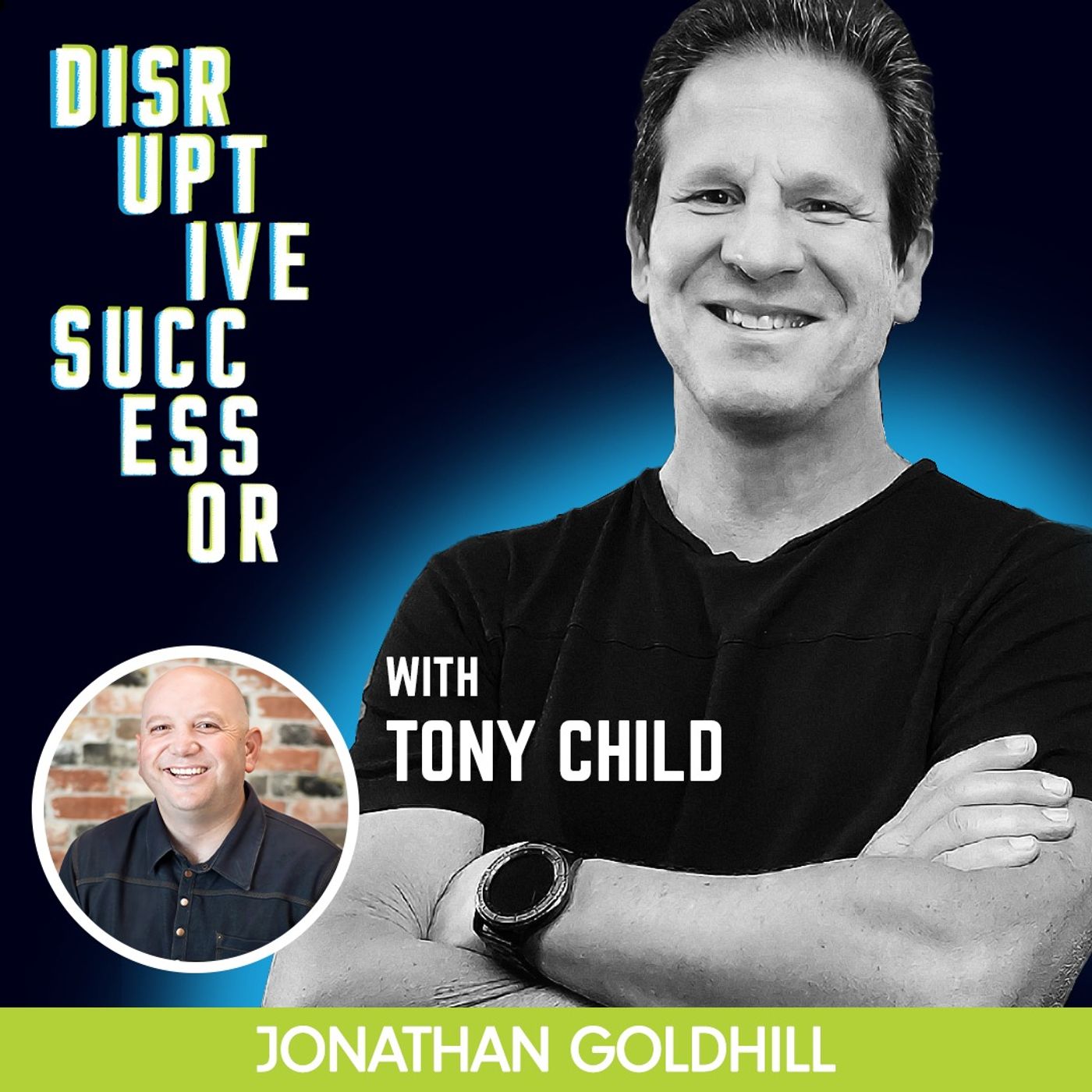
Episode 92 - Elevate Your Mindset, Success, and Gratitude with Tony Child
How does gratitude relate to your success?This is an interesting question, which will be answered by Tony Child, Founder, and Owner of Elevated Worldwide, which will share the light with us to have the right mindset in achieving success. Join Jonathan and Tony and learn more in this latest episode of The Disruptive Successor show.HIGHLIGHTSIntroducing Tony ChildWhat's the sense of gratitudeConfusion between gratitude and satisfactionDefining what success isThe formula to successQUOTESTony - Einstein’s hostile and friendly universe:“There's one quote that, like dictates everything in life. It's by Albert Einstein and he said this, he said, 'The greatest decision you'll ever make in your lifetime, is whether you believe you live in a hostile or a friendly universe.'”Tony - Thought on lack-based mentality:“I believe that like this idea, that there's only one winner and everyone else is a loser. That is a lack-based mentality, and sports is based in lack. It's based in competition, and I've heard this quote, many times, it was Bob Proctor that told me that 'Amateurs compete, where professionals create.'”Connect with Tony and learn more about his work:About TonyIf you enjoyed today’s episode, please subscribe, review and share with a friend who would benefit from the message. If you’re interested in picking up a copy of Jonathan Goldhill’s book, Disruptive Successor, go to the website at www.DisruptiveSuccessor.com
40:4620/09/2022
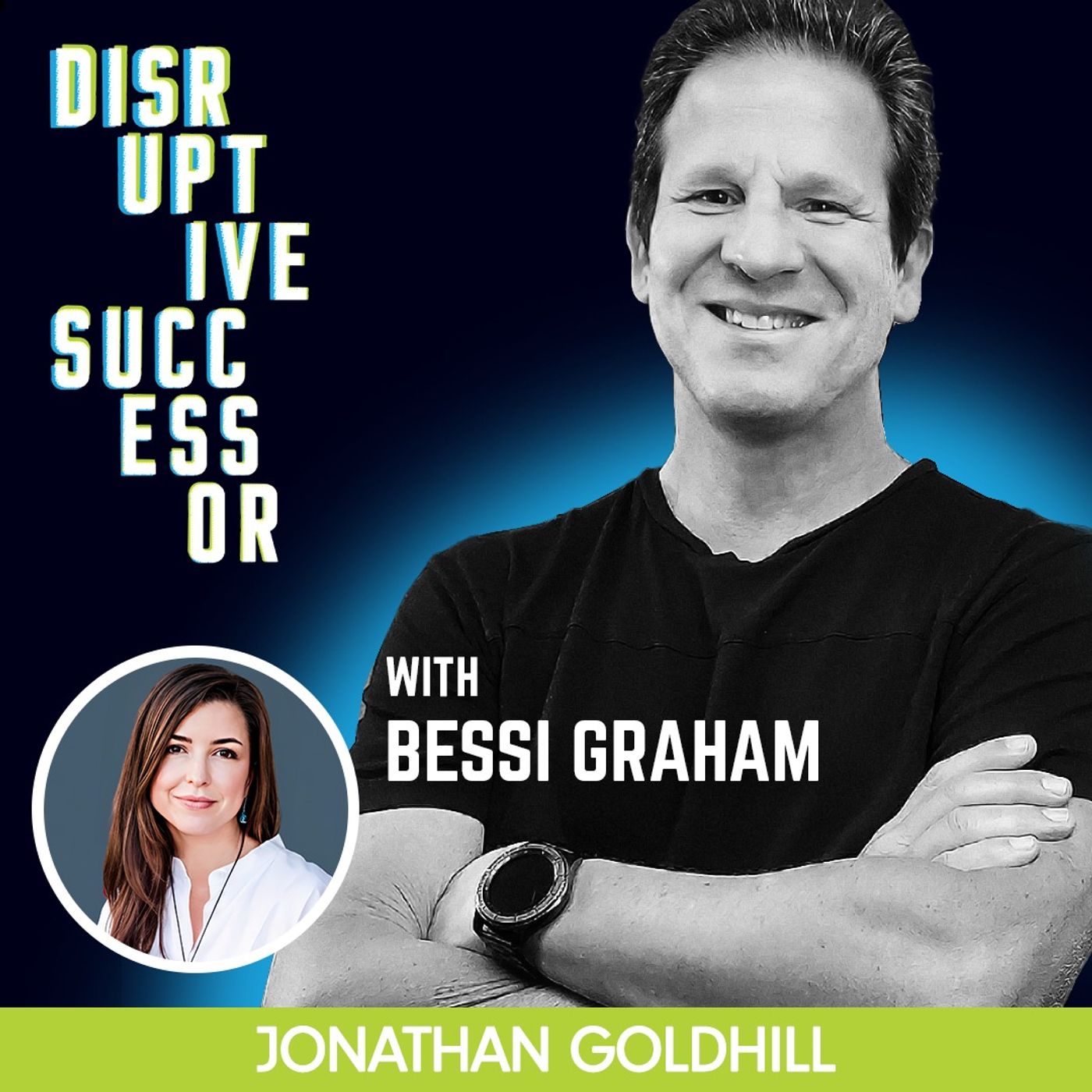
Episode 91 - How Does Doing Good and Doing Well Go Together with Bessi Graham
DO WELL AND DO GOOD ALTOGETHER.Many people are not too convinced that doing good for others while doing well in your own personal life can go together. In this episode, Jonathan welcomes Bessi Graham, a coach, podcaster, and co-founder of Benefit Capital. Bessi will give us new light on this matter and will be sharing her own experiences on this discovery, only here in the latest episode of The Disruptive Successor show.HIGHLIGHTSIntroducing Bessi GrahamDoing well while doing goodGrowing up in search of making an impactThe sense of fulfillment that money can't buyOverlapping of core values in business and personal lifeBessi's final thoughtsQUOTESBessi - You cannot solve it alone:“What happens when we take a bigger view of the world or of the systems we're operating in, is we very quickly realize that one person or one organization isn't the answer and can't solve everything.”Jonathan - Fill yourself up spiritually:“There's something that's very passionate about this work, and that it doesn't necessarily fill you up materially, although it can, it certainly fills you up in a spiritual way.”Bessi - Have clarity as to where you are moving towards:“We're either growing or we're dying, and that doesn't have to mean acquiring more things or getting more money, but it is about that sense of being clear on what are you moving towards.”Connect with Bessi and learn more about her work:About BessiBessiGraham.comAbout Benefit CapitalBenefitCapital.comIf you enjoyed today’s episode, please subscribe, review and share with a friend who would benefit from the message. If you’re interested in picking up a copy of Jonathan Goldhill’s book, Disruptive Successor, go to the website at www.DisruptiveSuccessor.com
50:3413/09/2022
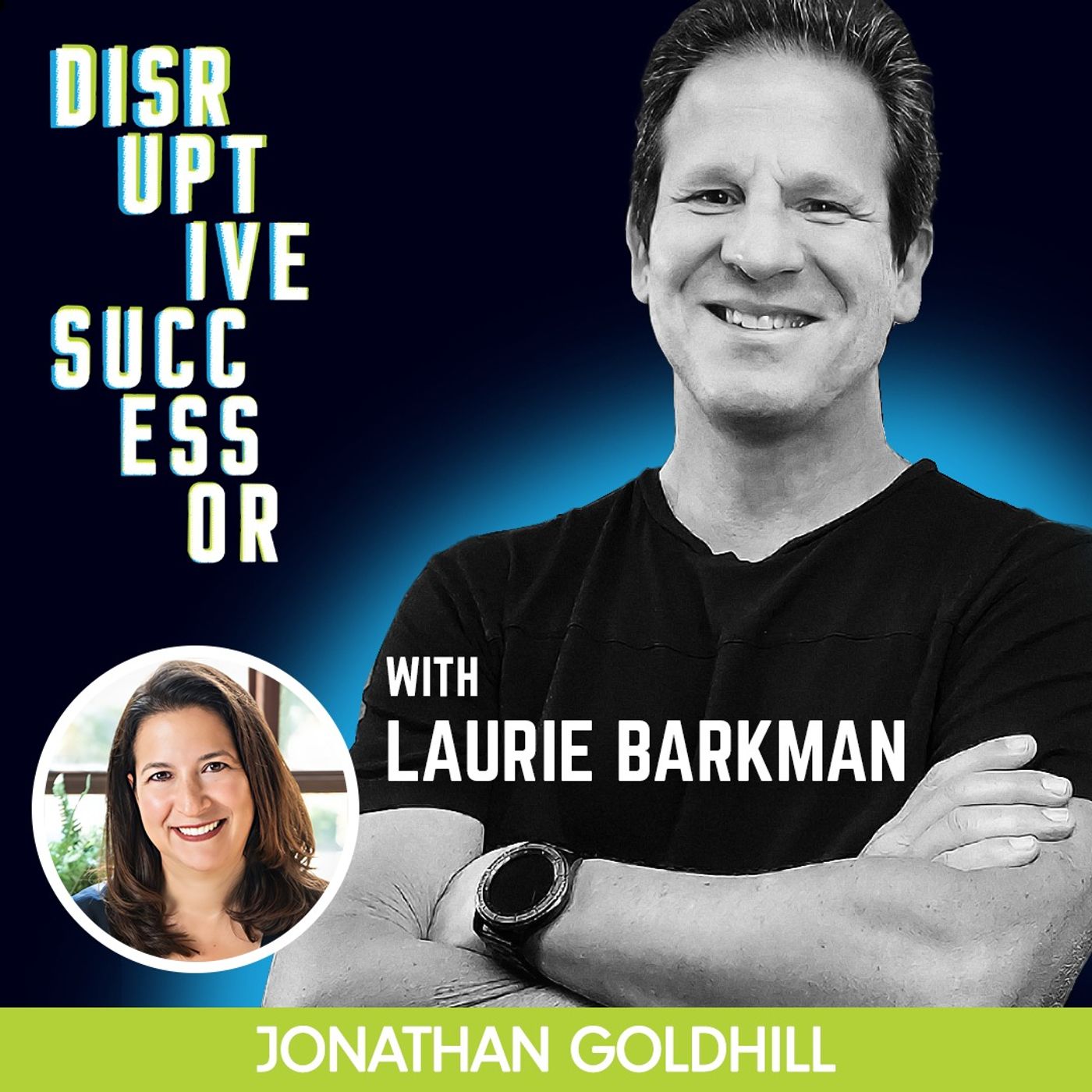
Episode 90 - Business Transition Advisory Discussion with Laurie Barkman
Sometimes, what’s difficult in moving on is not about whether you do it or not, it’s about how you will do it and with whom you are doing it.In this episode of The Disruptive Successor show, Jonathan welcomes Laurie Barkman, CEO, and Founder of SmallDotBig, who works to help business owners add value to their businesses and successions. Laurie will be sharing her story and advice to business owners who are planning their exits and successions along the way.HIGHLIGHTSIntroducing Laurie BarkmanExits and successions are as important as building and runningLaurie's point of view on diversityIns and outs of family boardsOpening up to outside advisory boardsDigging deep into strategic planningTo sell or to transferQUOTESLaurie - Surround yourself with equally skilled people to plan your exit:“It's important for them to realize that they'll want to have the same kind of talent around them on the sell side or to the transaction side, whatever that exit is for them and their succession.”Laurie - Diversity of thought, not the surface only:“How I like to describe it, Jonathan is a diversity of thought, and people's experiences and perspectives is what makes us diverse, I don't really look at us on the surface and say, This is a diverse board.”Laurie - Sell the business or transfer to the family:“Selling versus the family is tricky for a lot of the reasons we mentioned, maybe we want junior to have it but Junior, again, doesn't have the skills, either Junior is not interested, they don't have the skills, or it's a time sensitivity, where we just can't wait that long to see what happens.”Connect with Laurie and learn more about her work:About LaurieAbout SmallDotBigSmallDotBig.comIf you enjoyed today’s episode, please subscribe, review and share with a friend who would benefit from the message. If you’re interested in picking up a copy of Jonathan Goldhill’s book, Disruptive Successor, go to the website at www.DisruptiveSuccessor.com
52:5606/09/2022
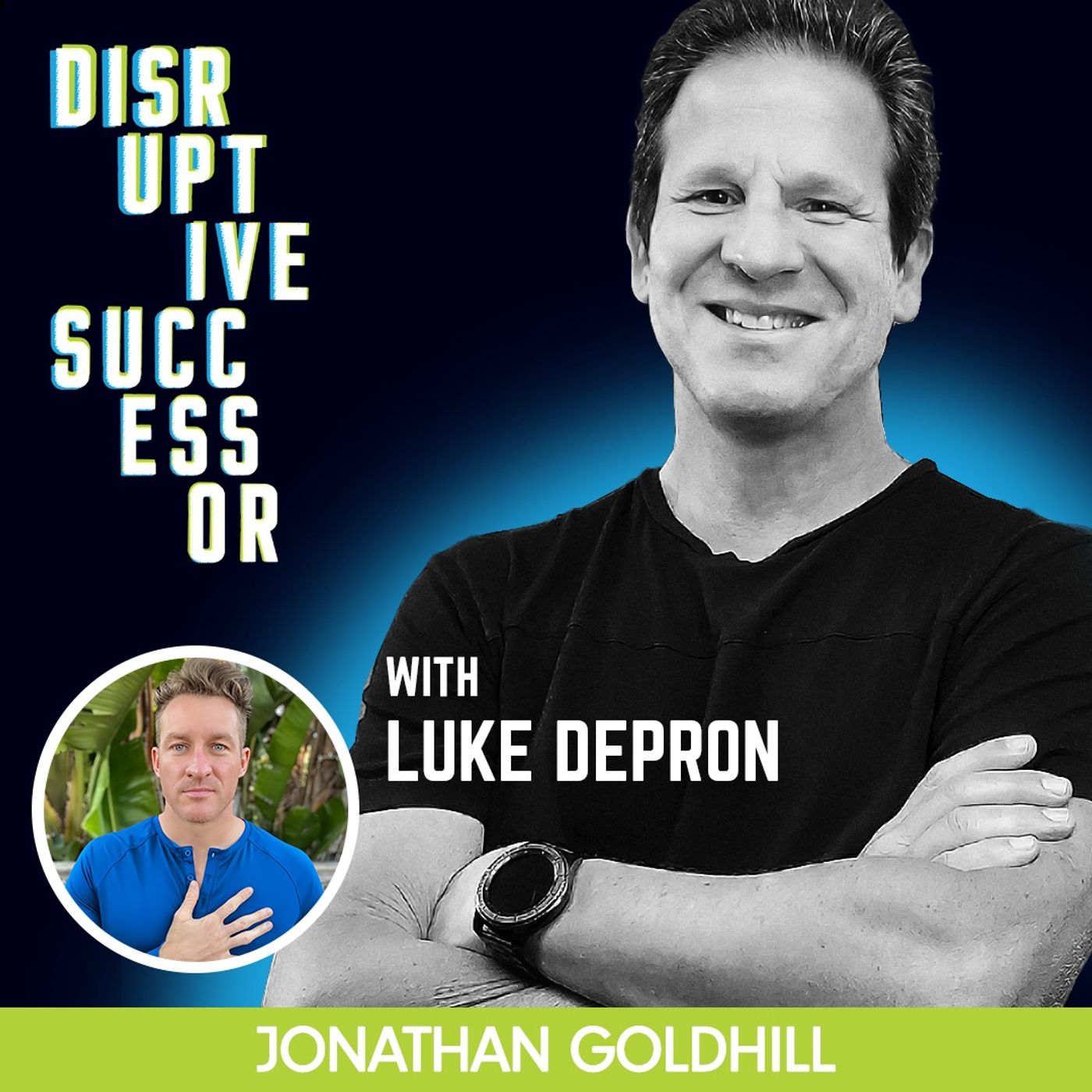
Episode 89 - How to Live a Great Lifestyle with Luke DePron
SOME PEOPLE ARE TOO BUSY BUILDING WEALTH WHILE THEY SACRIFICE THEIR HEALTH.Are you fit enough to work on your business? Luke DePron, the host and founder of Live Great Lifestyle is with Jonathan to discuss the ins and outs of getting fit and healthy for a more productive and positive way of running a business. Tune in and learn more about how you can achieve a fit and healthy body while achieving your business goals in this latest episode of The Disruptive Successor podcast.HIGHLIGHTSIntroducing Luke DePronEngaging in the bicycle businessWhy are health and fitness so importantIt's not just about how you look but also how you feelConfidence and energy framework for entrepreneursExercise advice for traveling entrepreneursThere is value in doing the work (exercise)QUOTESLuke - Working to educate about certain confusion over food:“There is a little bit of an educational component in what I do. And I think particularly around the food, there's a lot of confusion, a lot of marketing that unfortunately sets people up for failure.”Luke - It’s in buying, not eating:“We now have to get strategic with how we integrate that into our diet, and the strategy is very simple. It's [when] we use moderation as a buying strategy, not an eating strategy.”Luke - The passion to help towards change:“The goal of personal training was always a passion of mine, helping people really make a lifestyle change.”Connect with Luke and learn more about his work:About LukeLiveGreatLifestyle.comIf you enjoyed today’s episode, please subscribe, review and share with a friend who would benefit from the message. If you’re interested in picking up a copy of Jonathan Goldhill’s book, Disruptive Successor, go to the website at www.DisruptiveSuccessor.com
41:3230/08/2022
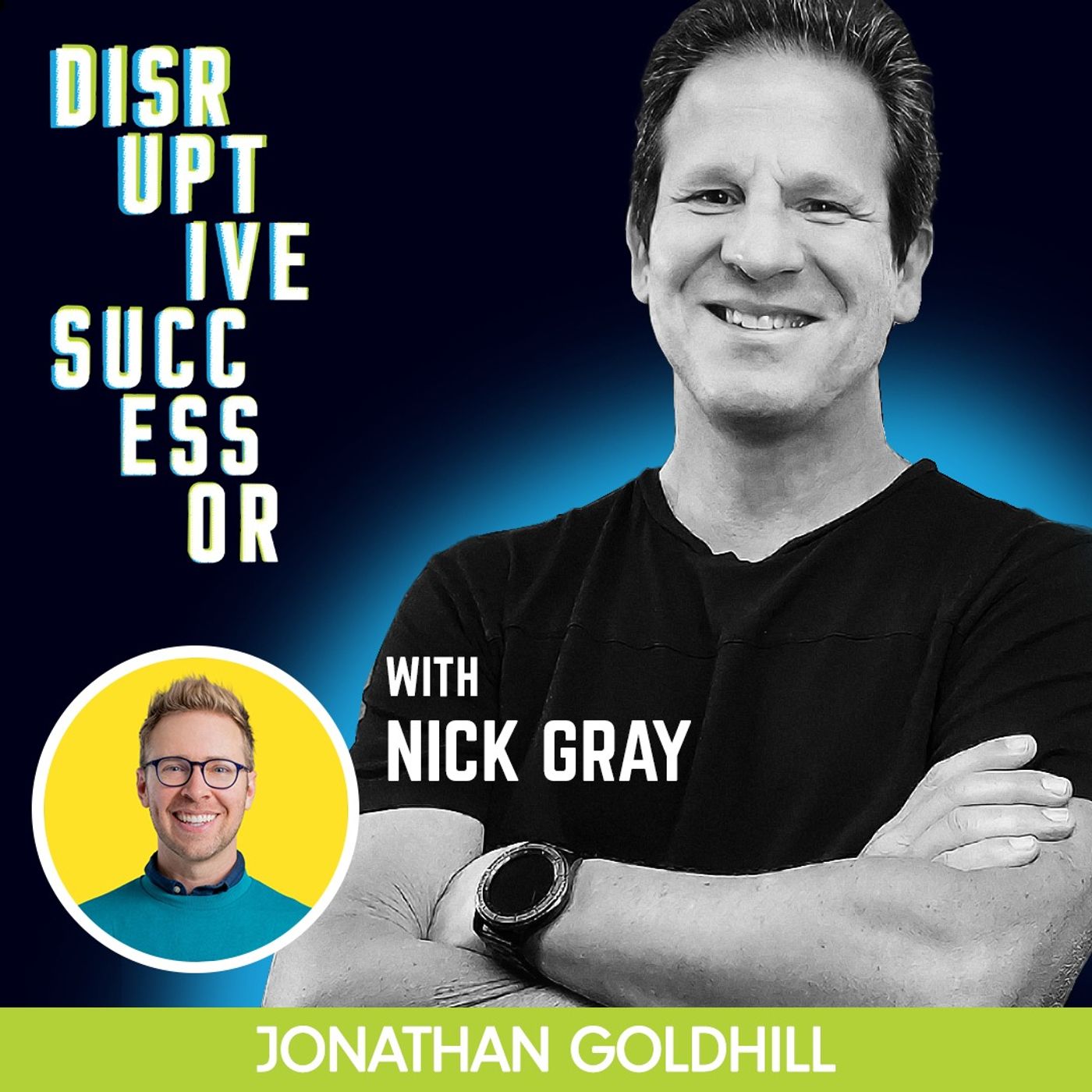
Episode 88 - Working with Your Parents - Talking with Nick Gray, Entrepreneur, 2x Exit Personality
Hosting a party is the easiest way to gather and get connections.This is the highlight of Nick Gray’s non-traditional book called “The 2-Hour Cocktail Party” where you learn how to party with rules and start new relationships that could potentially lead to business. Nick is the founder of Museum Hack and worked closely with his parents in Flight Display Systems, where he had his first taste of running a business, an experience he will be sharing here in the latest episode of The Disruptive Successor. HIGHLIGHTSIntroducing Nick GrayFather-son bonding with sellingGetting closer through the businessEach other's "fiefdoms" in the businessStarting and selling Museum HacksFamily-owned vs. hired gunThe idea behind "The 2-Hour Cocktail Party"QUOTESNick - The best part of working in a family business:“Working together brought us so much closer, and it's something that I wouldn't change for the world.”Nick - Role in the business with his mom and dad:“I lead a lot of our recruiting. So a lot of our hiring, I led all of our marketing and marketing extended to our print manuals for the products, the specification sheets, our magazine ads, our website, all the boxes, everything visual that was involved in the business.”Nick - Taking his own path and starting his own company:“It just wasn't something that I really wanted. I wasn't begging to be lined up for that business and that part of the country, and so ultimately, about a year before the business sold, I had kind of left and started my new company.”Connect with Nick and learn more about his work:About NickNick’s WebsiteNick’s BlogIf you enjoyed today’s episode, please subscribe, review and share with a friend who would benefit from the message. If you’re interested in picking up a copy of Jonathan Goldhill’s book, Disruptive Successor, go to the website at www.DisruptiveSuccessor.com
38:3724/08/2022
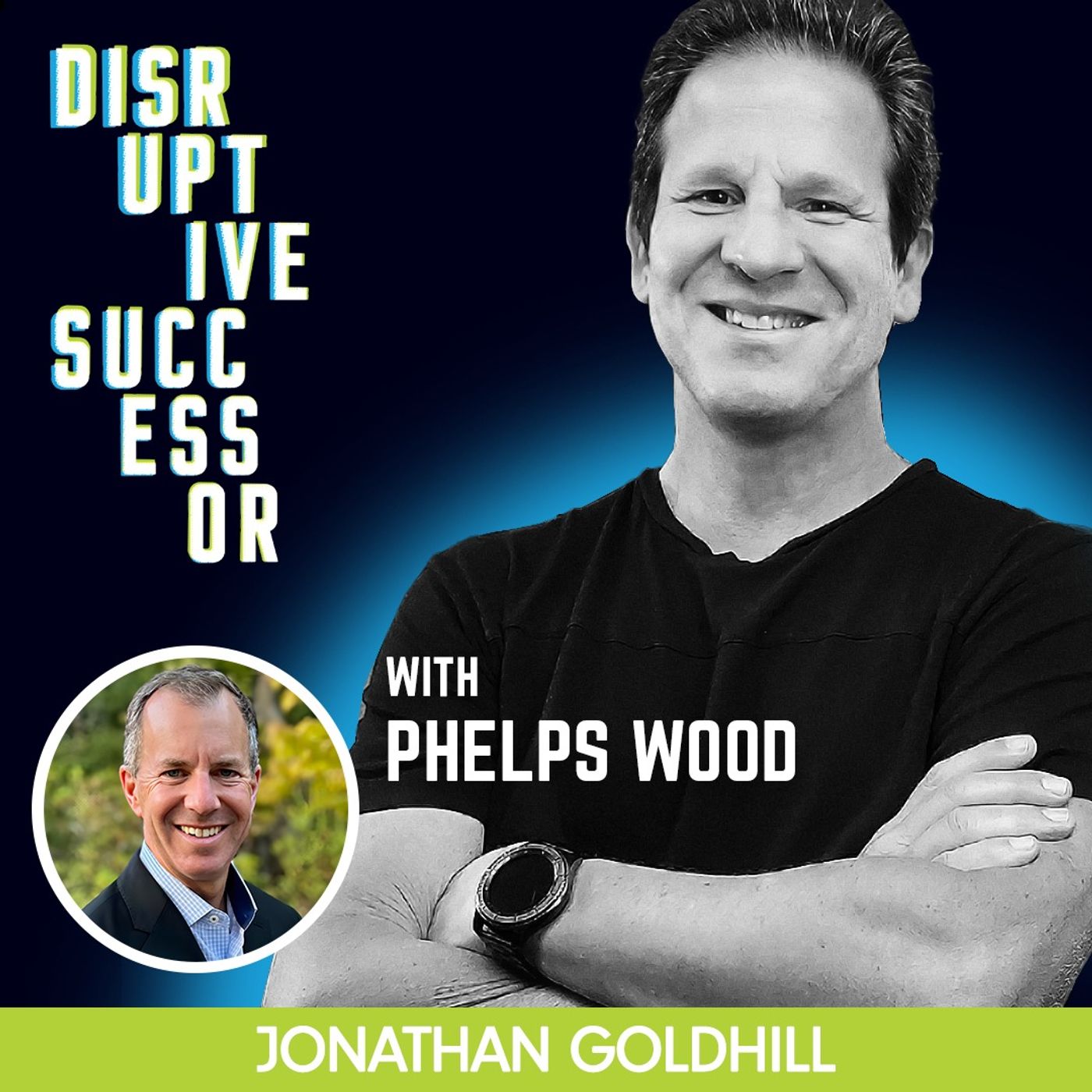
Episode 87 - Transition of a Family Business – A Case Study with Phelps Wood
FAILING TO PLAN IS PLANNING TO FAIL.Very common words that are said by many but not applied so often by people, especially with matters of succession and exits. In this episode of The Disruptive Successor podcast, Jonathan welcomes Phelps Wood, a Family Business Advisor and Founder of Tres Across. Phelps will be talking about the importance of Succession Planning or Exit Planning through a case study on his personal experience with their family business, and what are the things you need to know before doing so.HIGHLIGHTSIntroducing Phelps WoodExits or successions should be plannedLeaving and going back to the family businessThe sweet spot of succession planningDifficulty of letting goExplaining the 5 Ds of businessKnow your financialsCommunicate early and oftenQUOTESPhelps - Thinking about succession or exit planning: “I think the key is that whether you're going to call it Succession planning or Exit Planning, it's something that business owners need to be thinking about.”Phelps - The 5 Ds of business: “They talk about the five Ds of businesses, which none of them are positive, you know, death, disability, dissolution, divorce, and one of them is departure.”Phelps - Common things business parents do with their kids: “That's very common in a lot of family businesses, the kids are kind of introduced to the business by their parents, because it's such an important part of their life, you know, the people that work there, some of the individuals end up almost as family members.”Phelps - Know about the financials:“You've got to get your hands around the financials, of the of not only the business, but I'd say Don't think of it as a family business, but think of it as a kind of family enterprise.”Phelps - Communicate early and often: “I think the one lesson learned is, communicate early and often, you've got to put procedures in place to ensure that that communication happens.”Connect with Phelps and learn more about his work:About PhelpsTres Arcos PartnersEmail: [email protected] you enjoyed today’s episode, please subscribe, review and share with a friend who would benefit from the message. If you’re interested in picking up a copy of Jonathan Goldhill’s book, Disruptive Successor, go to the website at www.DisruptiveSuccessor.com
44:4617/08/2022
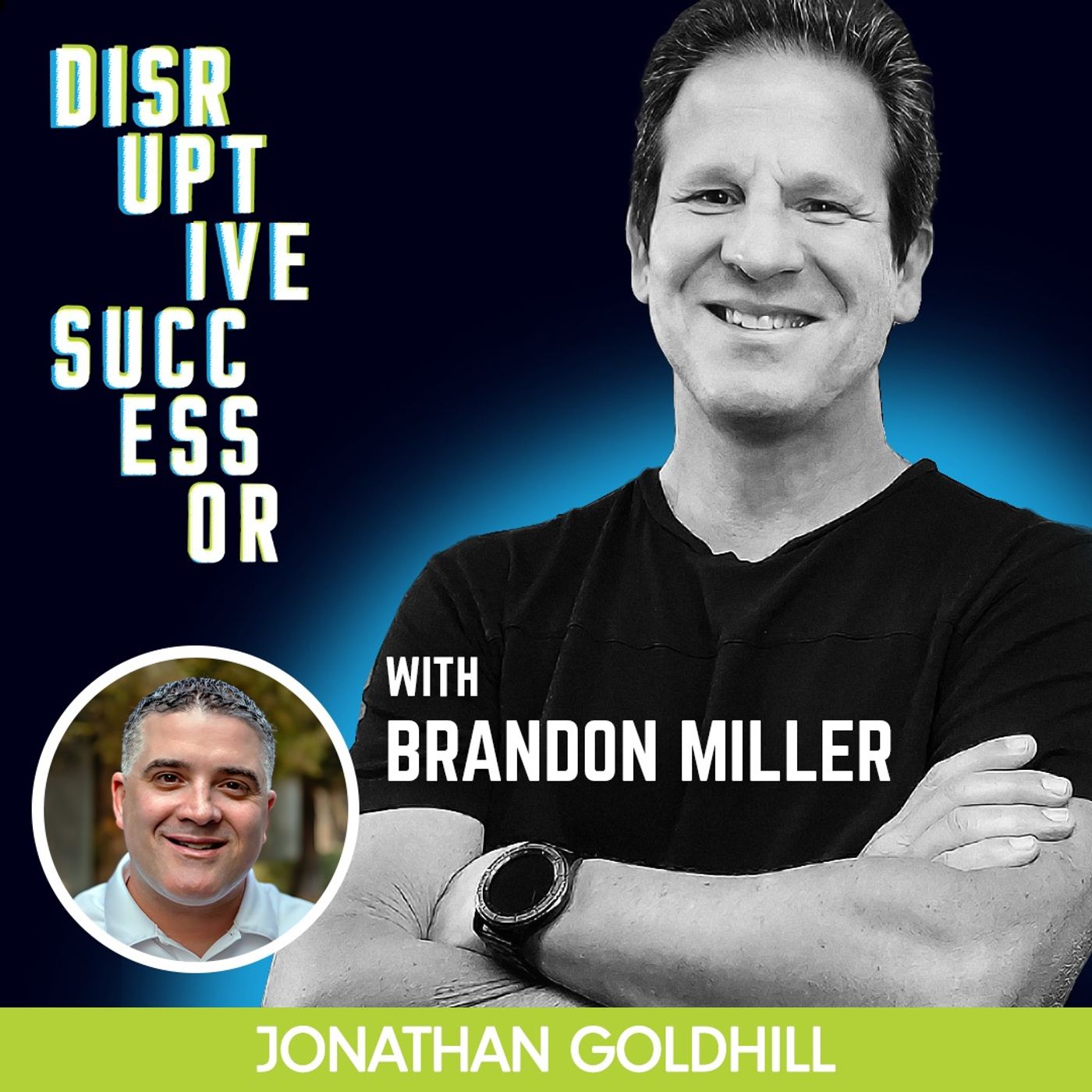
Episode 86 - The Value of Employee Engagement with Brandon Miller of 34 Strong
Why spend your time fixing weaknesses when there are strengths that you can build on? Jonathan welcomes Brandon Miller, Co-Founder, and CEO of 34 Strong, a company dedicated to help organizations elevate to be one of the best places to work. Brandon will be sharing how he uses assessments on his own kids and cite them as examples in his discussions, and discover what StrengthsFinder is, and what 34 Strong does. So tune in and learn all these in this latest episode of The Disruptive Successor podcast.HIGHLIGHTSIntroducing Brandon MillerWhat is StrengthsFinderThe ideal assessment to useLeaders and teams should have assessmentsFocus on your strengths, not build on weaknessesWhat is 34 StrongQUOTESBrandon - The issue with parenting:“In parenting, school management, we do the exact opposite. We position them to get better at something, they're not as good at it. So why don't we just take this approach we already all know, apply it to these areas, we probably could get better outcomes.”Brandon - The right tool to use:“Any tool can be effective if it's well educated inside and where we found the gap in organizations we work with, is the intention of leaders to have effective tools to help teams become highly engaged.”Brandon - Don’t turn your employees into you:“What I did worked for me, may not work for them. If I try to turn them into me, I'm essentially asking them to become who they're not, and this almost never works out well.”Jonathan - What really gives you the advantage:“It's not technology, it's not strategy, it's not finance, but it's basically teams that are healthy and engaged teams that give you the ultimate competitive advantage.”Brandon - What 34 Strong is and does:“We go into organizations that typically are starting from a place where they have a challenge, and we're helping them to grow into or become a recognized best place to work.”Connect with Brandon and learn more about her work:About BrandonAbout 34 Strong34 Strong WebsiteIf you enjoyed today’s episode, please subscribe, review and share with a friend who would benefit from the message. If you’re interested in picking up a copy of Jonathan Goldhill’s book, Disruptive Successor, go to the website at www.DisruptiveSuccessor.com
37:1609/08/2022
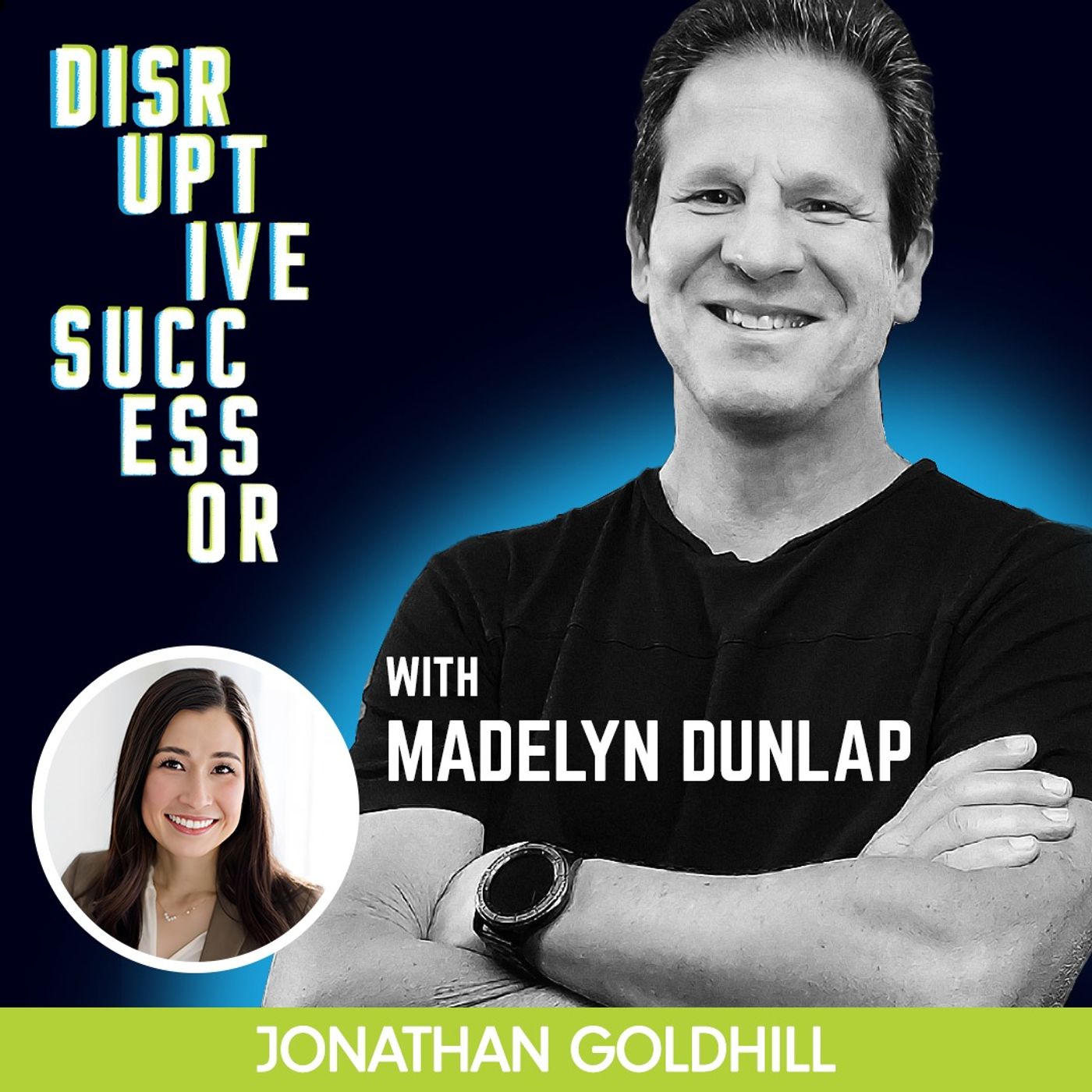
Episode 85 - Talking Stages of Growth with Madelyn Dunlap of ReWild Group
As a Business Development Strategist, Madelyn Dunlap focuses on company growth and how to proceed with the growing process properly. Jonathan Goldhill welcomes Madelyn in this latest episode of The Disruptive Successor, as they talk about the 7 stages of growth and many more.HIGHLIGHTSIntroducing Madelyn DunlapFascination with data in businessMadelyn's 7 stages of growthThrough flood zones and wind tunnelsExplaining the stagesQUOTESMadelyn’s fascination with data:“I was fascinated with not just data, but what data can do for us and how we can use this information to make better decisions, and business more successful decisions.”Madelyn explaining what the stages of growth:“As you add people to your organization, you add complexity, each person comes to your organization with skills and with their own background. And as you add them, the relationships, the interrelationships. It doesn't just increase, it really multiplies. It grows exponentially.”Madelyn on embracing chaos:“One of our rules is to really embrace the chaos and create process only where necessary.”Madelyn’s view on stagnation vs. innovation:“One of the greatest challenges is stagnation, that you are not being innovative.”Connect with Madelyn and learn more about her work:About MadelynAbout The ReWild Group LLCThe ReWild Group LLC WebsiteIf you enjoyed today’s episode, please subscribe, review and share with a friend who would benefit from the message. If you’re interested in picking up a copy of Jonathan Goldhill’s book, Disruptive Successor, go to the website at www.DisruptiveSuccessor.com
36:3102/08/2022





